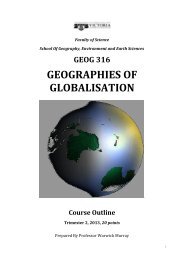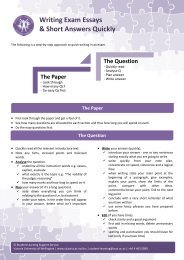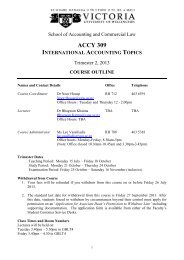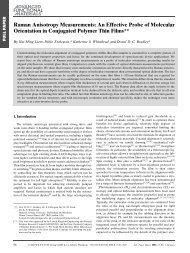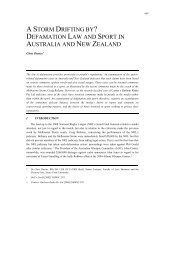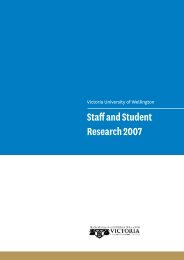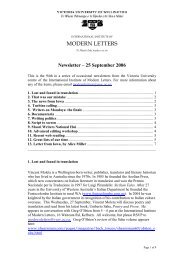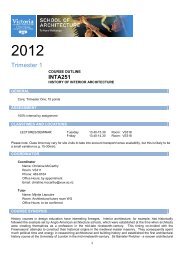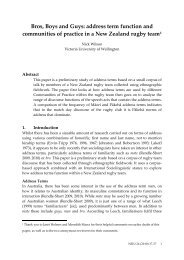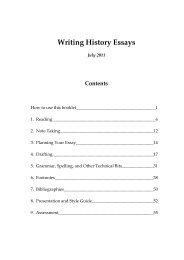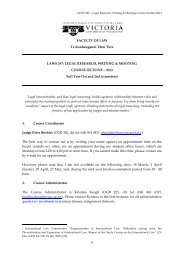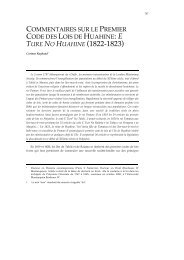Forestry and Timber Trading in the Bay of Islands 1769-1840
Forestry and Timber Trading in the Bay of Islands 1769-1840
Forestry and Timber Trading in the Bay of Islands 1769-1840
You also want an ePaper? Increase the reach of your titles
YUMPU automatically turns print PDFs into web optimized ePapers that Google loves.
1TREATY RESEARCH SERIESTREATY OF WAITANGI RESEARCH UNITGe<strong>of</strong>f Park (2006)<strong>Forestry</strong> <strong>and</strong> <strong>Timber</strong> <strong>Trad<strong>in</strong>g</strong> <strong>in</strong> <strong>the</strong> <strong>Bay</strong> <strong>of</strong>Isl<strong>and</strong>s, <strong>1769</strong>-<strong>1840</strong>Introduction to 2013 publicationThis previously unpublished paper by <strong>the</strong> late Ge<strong>of</strong>f Park is a companion pieceto ‘The Enchanter’s W<strong>and</strong>’: The Transformation <strong>of</strong> Whenua <strong>in</strong> pre-<strong>1840</strong> <strong>Bay</strong> <strong>of</strong> Isl<strong>and</strong>s,published <strong>in</strong> June 2103 <strong>in</strong> this series. Produced for <strong>the</strong> Treaty <strong>of</strong> WaitangiResearch Unit, this paper formed part <strong>of</strong> an enquiry by <strong>the</strong> Marsden-fundedresearch programme Te Paeatatu. Researched <strong>and</strong> written to provide archivesbasedbackground <strong>in</strong>formation for oral-history based research, it rema<strong>in</strong>s <strong>in</strong> draftform only. But both <strong>the</strong> Te Paeatatu adm<strong>in</strong>istration <strong>and</strong> editors <strong>of</strong> this seriesbelieve it deserves to be made public. The paper is <strong>in</strong> two parts, ‘KupuWhakataki’ <strong>and</strong> ‘The <strong>Timber</strong> Resource’ (page 23), <strong>and</strong> is followed by a briefConclusion on page 88. For a fuller account <strong>of</strong> <strong>the</strong> genesis <strong>and</strong> status <strong>of</strong> thispaper, <strong>the</strong> Introduction to ‘The Enchanter’s W<strong>and</strong>’ should be consulted. Thepublishers would like to thank <strong>the</strong> Marsden Fund for its generous support <strong>of</strong> <strong>the</strong>late Dr Park’s research on this topic.Richard Hill,Treaty <strong>of</strong> Waitangi Research Unit,Stout Research Centre for New Zeal<strong>and</strong> StudiesJuly 2013.
2Part 1: Kupu WhakatakiThe <strong>Bay</strong> <strong>of</strong> Isl<strong>and</strong>s was <strong>the</strong> whenua that first came under susta<strong>in</strong>ed European<strong>in</strong>fluences <strong>and</strong> became irreversibly changed by <strong>the</strong>m. It is also <strong>the</strong> whenua <strong>in</strong>which, on 6 February, <strong>1840</strong>, Te Tiriti o Waitangi, <strong>the</strong> Treaty <strong>of</strong> Waitangi, wasorig<strong>in</strong>ally signed; <strong>and</strong>, <strong>in</strong> which, two days beforeh<strong>and</strong>, its Second Articleguarantee<strong>in</strong>g rangatira possession’ <strong>of</strong> <strong>the</strong>ir resources <strong>and</strong> taonga was formulated.<strong>Bay</strong> <strong>of</strong> Isl<strong>and</strong>s chiefs predom<strong>in</strong>ated among <strong>the</strong> rangatira who met at Te Tii priorto debat<strong>in</strong>g <strong>the</strong> treaty with Queen Victoria’s envoy, William Hobson, across <strong>the</strong>estuary at Waitangi on 5 February, <strong>and</strong> sign<strong>in</strong>g it <strong>the</strong> follow<strong>in</strong>g afternoon.On 30 January, <strong>the</strong> day after Hobson’s arrival <strong>in</strong> <strong>the</strong> <strong>Bay</strong> <strong>of</strong> Isl<strong>and</strong>s, heproclaimed himself Lieutenant-Governor, <strong>and</strong> sent out a letter to local TaiTokerau chiefs <strong>in</strong>vit<strong>in</strong>g <strong>the</strong>m to <strong>the</strong> 5 February assembly at Waitangi. No Maoriare believed to have visited Hobson on HMS Herald <strong>in</strong> that period, but it hasbeen said that all or any <strong>of</strong> his European visitors could have <strong>in</strong>fluenced <strong>the</strong>significant changes that were made to <strong>the</strong> imperial treaty-mak<strong>in</strong>g knowledgewhich he had brought to New Zeal<strong>and</strong>. 1 The most significant, it is believed, weremade by James Busby, who, after ceas<strong>in</strong>g to be <strong>the</strong> British Resident on Hobson’sproclamation, had <strong>of</strong>fered him all <strong>the</strong> help he could <strong>in</strong> draw<strong>in</strong>g up a treaty thatrangatira would sign. 2In particular, Busby placed <strong>in</strong> front <strong>of</strong> <strong>the</strong> Second Article, which was aboutCrown pre-emption <strong>in</strong> future sales <strong>of</strong> Maori l<strong>and</strong>, a guarantee to rangatira <strong>and</strong><strong>the</strong>ir iwi <strong>of</strong> ‘<strong>the</strong> full, exclusive <strong>and</strong> undisturbed possession <strong>of</strong> <strong>the</strong>ir L<strong>and</strong>s <strong>and</strong>Estates, Forests, Fisheries <strong>and</strong> o<strong>the</strong>r properties’. It was not <strong>the</strong> first time he hadproposed it. Three years before, report<strong>in</strong>g his ‘observations on <strong>the</strong> state <strong>of</strong> <strong>the</strong>country’ to <strong>the</strong> Colonial Secretary, Busby had described Maori <strong>of</strong> <strong>the</strong> <strong>Bay</strong> <strong>of</strong>Isl<strong>and</strong>s <strong>and</strong> its environs as a people rapidly los<strong>in</strong>g <strong>the</strong>ir whenua, but who wouldneed to reta<strong>in</strong> <strong>the</strong>ir customary relations with it if <strong>the</strong>y were to survive.Humanity, he said, would require that:
3By 1837, far from ‘<strong>the</strong> strongest hopes’ that Busby had held for Maori when hefirst came to <strong>the</strong> <strong>Bay</strong> <strong>of</strong> Isl<strong>and</strong>s <strong>in</strong> 1833 – ‘a people <strong>of</strong> strong naturalendowment
5ratou whenua, ratou ka<strong>in</strong>ga, ratou taonga katoa, parallel<strong>in</strong>g <strong>in</strong> <strong>the</strong> English text<strong>the</strong> term ‘<strong>the</strong>ir L<strong>and</strong>s <strong>and</strong> Estates, Forests, Fisheries <strong>and</strong> o<strong>the</strong>r propertieswhich <strong>the</strong>y may collectively or <strong>in</strong>dividually possess’.The significant differences between <strong>the</strong> Treaty/Te Tiriti’s English <strong>and</strong> Maori textshas always been <strong>of</strong> concern. Not least <strong>the</strong> words ‘te t<strong>in</strong>o rangatiratanga’, whichwould have meant far more to Te Taitokerau Maori <strong>in</strong> <strong>1840</strong> than ‘possession’;<strong>and</strong> ‘taonga’, which would have meant that <strong>the</strong> treaty promised <strong>the</strong> retention <strong>of</strong>‘anyth<strong>in</strong>g highly prized’. As a result <strong>of</strong> <strong>the</strong> 6 February <strong>1840</strong> sign<strong>in</strong>g at Waitangi,<strong>the</strong> English negotiators thought that <strong>the</strong> First Article ceded sovereignty, <strong>and</strong> <strong>the</strong>Maori signatories thought <strong>the</strong> Second Article reta<strong>in</strong>ed for <strong>the</strong>m a wide range <strong>of</strong>chiefly power. 9But as we have noted, <strong>the</strong> treaty’s translation <strong>in</strong>to Maori was not by Maori.Instead, as <strong>the</strong> Rev. Henry Williams later recollected, ‘On <strong>the</strong> 4 th <strong>of</strong> February,about 4 o’clock p.m, Capta<strong>in</strong> Hobson came to me with <strong>the</strong> Treaty <strong>of</strong> Waitangisay<strong>in</strong>g he would meet me <strong>in</strong> <strong>the</strong> morn<strong>in</strong>g at <strong>the</strong> House <strong>of</strong> <strong>the</strong> British Resident, MrBusby; when it must be read to <strong>the</strong> chiefs assembled at 10 o’clock’. 10 With hisMaori-speak<strong>in</strong>g son Edward, Williams worked through <strong>the</strong> night to ensure itwas translated. Subsequently, it has <strong>of</strong>ten been expressed or implied that <strong>the</strong>irtranslation <strong>of</strong> <strong>the</strong> Treaty <strong>in</strong>to Maori was unfaithful to <strong>the</strong> English text. 11Hobson’s Surveyor-General, Felton Ma<strong>the</strong>w, estimated that about 200 Maoriattended <strong>the</strong> 5 February hui. 12 Many <strong>of</strong> <strong>the</strong> assembled rangatira who spoke to <strong>the</strong>Lieutenant-Governor expressed <strong>the</strong>ir opposition to <strong>the</strong> words he read out <strong>in</strong>English followed by Henry Williams’ article by article Maori translation. The firstrangatira to speak, Te Kemara, tohunga <strong>of</strong> <strong>the</strong> chief Kawiti, told Hobson, it washis, Te Kemara’s, whenua that <strong>the</strong>y stood on, but like <strong>the</strong> rest <strong>of</strong> <strong>the</strong> <strong>in</strong>heritances<strong>of</strong> his ancestors, it was ‘all gone, stolen, gone with <strong>the</strong> missionaries’. 13 He wantedhis l<strong>and</strong>s returned <strong>and</strong> for Hobson to leave, <strong>the</strong>mes that both his bro<strong>the</strong>rrangatira Rewa, <strong>and</strong> Kawiti, reiterated.Of <strong>the</strong> chiefs, only Ngati Hao’s Tamati Waka Nene made reference to <strong>the</strong> greattransformation <strong>the</strong>ir whenua had undergone s<strong>in</strong>ce Europeans had entered it, <strong>and</strong>9 Owens, The Mediator, p.44.10 Quoted <strong>in</strong> R. M. Ross, „Te Tiriti o Waitangi: Texts <strong>and</strong> Translations‟, New Zeal<strong>and</strong> Journal <strong>of</strong> History,October 1972, p.133.11 Richard Dawson, „Waitangi, Translation, <strong>and</strong> Metaphor‟, Sites (New Series), Vol. 2, No 2, 2005.12 Felton Ma<strong>the</strong>w, cited <strong>in</strong> Owens, The Mediator, p.45.13 Te Kemara, quoted <strong>in</strong> William Colenso, The Au<strong>the</strong>ntic <strong>and</strong> Genu<strong>in</strong>e History <strong>of</strong> <strong>the</strong> Treaty <strong>of</strong> Waitangi,Well<strong>in</strong>gton, 1890 pp.17-18.
6<strong>the</strong> irreversibility <strong>of</strong> <strong>the</strong> changes. Contemporary accounts, notably WilliamColenso’s, credit Nene’s speak<strong>in</strong>g <strong>in</strong> such terms with sw<strong>in</strong>g<strong>in</strong>g <strong>the</strong> debate <strong>in</strong>favour <strong>of</strong> sign<strong>in</strong>g. 14 Speak<strong>in</strong>g first to <strong>the</strong> assembled Maori, while <strong>the</strong> Rev HenryWilliams translated his words for Hobson, he asked:Me pēhea oti tātou. Kī mai ahau ē ngā rangatira o te Taitokerau. Ko waitātou? E aha ana tātou?Say <strong>the</strong>n, o ye chiefs <strong>of</strong> <strong>the</strong> tribes <strong>of</strong> <strong>the</strong> nor<strong>the</strong>rn part <strong>of</strong> New Zeal<strong>and</strong>,what we? How we? 15Kua ngaro ke <strong>in</strong>a<strong>in</strong>ei te whenua?Is not <strong>the</strong> l<strong>and</strong> already gone?Kua pōkia kētia te katoa o te whenua e te t<strong>in</strong>i o te tangata – te tauhou, e tetauiwi – anō hē karāihe, he otaota, e hora ana kit e uhi i te whenua?Is it not all covered with men, with strangers, foreigners – even as <strong>the</strong>grass <strong>and</strong> <strong>the</strong> herbage – over whom we have no power?Castigat<strong>in</strong>g those rangatira who had dem<strong>and</strong>ed Hobson return to Engl<strong>and</strong>, <strong>and</strong>leave <strong>the</strong>ir whenua to <strong>the</strong>m, Nene exclaimed:Mehemea koutou I kōrero pēnā i ngā wā o mua rā I te taenga mai o ngāiwi hokohoko, iwi hoko ramaHad you spoken thus <strong>in</strong> <strong>the</strong> old times when <strong>the</strong> traders <strong>and</strong> grog-sellerscameMehemea koutou i pana atu I a rātou, kua kaha koutou ki te kōrero ki teKāwana, e hoki, nā kua rite kua tika. A kua ki atu tātou katoa: ‚E hoki‛!Had you turned <strong>the</strong>m away, <strong>the</strong>n you could well say to <strong>the</strong> Governor, Goback, <strong>and</strong> it would have been correct, tika, straight. And I would also havesaid with you, we toge<strong>the</strong>r one man, one voice: Go back14 Colenso, Au<strong>the</strong>ntic <strong>and</strong> Genu<strong>in</strong>e History15 Campion, Richard, <strong>in</strong> Richard Hill (ed.), Waitangi – ‘I Was There’: A 1986 Docu-drama, Well<strong>in</strong>gton,2003; <strong>the</strong> korero were re-created by Wiremu Parker from Colenso‟s Au<strong>the</strong>ntic <strong>and</strong> Genu<strong>in</strong>e History.
7Ā, e hoa mā, nā wai kē ngā taewa e kai nei tātou? Nō wai kē o tātouparaikete
8Hokianga <strong>and</strong> Whangaruru. But as Colenso’s critical eye perceived, ‘not manychiefs <strong>of</strong> first rank had signed’. He concurred with Henry Williams that <strong>the</strong>‘greater part <strong>of</strong> <strong>the</strong>m were from <strong>the</strong> <strong>Bay</strong> <strong>of</strong> Isl<strong>and</strong>s <strong>and</strong> its immediate vic<strong>in</strong>ity’, aswas confirmed by names on <strong>the</strong> treaty sheet. 20 One high-rank<strong>in</strong>g chief, Rewa, hadreservations right to <strong>the</strong> very end, <strong>and</strong> was only persuaded to sign by <strong>the</strong> advice<strong>of</strong> his fellow chiefs <strong>and</strong> <strong>the</strong> English missionaries that Maori <strong>in</strong>terests would bebest served by agree<strong>in</strong>g to <strong>the</strong> treaty. 21 Two major <strong>Bay</strong> <strong>of</strong> Isl<strong>and</strong>s chiefs, Kawiti<strong>and</strong> Pomare, refused to sign, 22 Kawiti eventually do<strong>in</strong>g so several months after<strong>the</strong> event. Two months after <strong>the</strong> orig<strong>in</strong>al Waitangi sign<strong>in</strong>g, when Hobson took<strong>the</strong> treaty north for signature, Kaitaia chief Nopera Panakareao warned him <strong>of</strong> aconspiracy aga<strong>in</strong>st him led by Kawiti <strong>and</strong> some <strong>of</strong> <strong>the</strong> Ngapuhi chiefs who hadnot signed. 23When Maori ga<strong>the</strong>red to discuss ‘<strong>the</strong> spirit <strong>of</strong> <strong>the</strong> Treaty’ generations after <strong>the</strong>events <strong>of</strong> <strong>1840</strong>, as at <strong>the</strong> Orakei Parliament <strong>in</strong> 1879, <strong>the</strong> pr<strong>in</strong>ciple mosthighlighted <strong>in</strong> <strong>the</strong> korero was <strong>the</strong> stipulation ‘that we should reta<strong>in</strong> <strong>the</strong> mana <strong>of</strong>our l<strong>and</strong>s; <strong>the</strong> mana <strong>of</strong> our forests, fisheries, pipi grounds
9primal fact that whatever it took from <strong>the</strong>m, <strong>the</strong> treaty left <strong>the</strong>m <strong>in</strong> securepossession <strong>of</strong> <strong>the</strong>ir l<strong>and</strong>s. 28None<strong>the</strong>less, as Buick himself allowed, <strong>the</strong>re was almost noth<strong>in</strong>g recorded <strong>of</strong>what was said with<strong>in</strong> Maori circles dur<strong>in</strong>g 5-6 February, <strong>and</strong> little <strong>of</strong> it wasconveyed to Hobson. Colenso himself commented on <strong>the</strong> fact, how, afterconsiderable discussion on l<strong>and</strong> <strong>and</strong> missionaries:
10shap<strong>in</strong>g <strong>of</strong> <strong>the</strong> treaty’s Second Article <strong>and</strong> <strong>the</strong> choice <strong>of</strong> words <strong>in</strong> its English text<strong>and</strong> its translation <strong>in</strong>to Maori.We have no means <strong>of</strong> know<strong>in</strong>g whe<strong>the</strong>r, without Busby’s additions to <strong>the</strong> SecondArticle or Williams’ translatory shifts <strong>of</strong> mean<strong>in</strong>g, <strong>the</strong> treaty would have beensigned. 31 Judith B<strong>in</strong>ney has argued that <strong>the</strong>se particularities <strong>of</strong> environment <strong>and</strong>experience were critical factors. Without <strong>the</strong>m, she suggests, such a Treaty wouldnot have been possible. 32 Central to B<strong>in</strong>ney’s <strong>the</strong>sis is <strong>the</strong> fact that <strong>the</strong> two menwith whom William Hobson worked to shape <strong>the</strong> treaty’s text – Busby <strong>and</strong>Williams – knew <strong>the</strong> strong customary, life-susta<strong>in</strong><strong>in</strong>g ties between Maori <strong>and</strong><strong>the</strong>ir l<strong>and</strong> <strong>and</strong> waterways.Prior to <strong>the</strong> entry <strong>of</strong> European <strong>in</strong>fluences, <strong>the</strong> <strong>Bay</strong> <strong>of</strong> Isl<strong>and</strong>s l<strong>and</strong>scape was one‘harbour<strong>in</strong>g a huge population’ because it conta<strong>in</strong>ed ‘<strong>in</strong> abundance
11had made told Maori that central to his purpose, as British Resident, wasconsult<strong>in</strong>g with ‘all <strong>the</strong> Chiefs
13with <strong>the</strong> chiefs such as he had proposed, would be completed. He had not sentfor Titore, he added, as ‘it would give him an importance <strong>in</strong> his own eyes whichwould make it more difficult to deal with him’. 43By 1833, <strong>the</strong> wealth <strong>of</strong> <strong>the</strong> <strong>Bay</strong> <strong>of</strong> Isl<strong>and</strong>s <strong>and</strong> its rangatira derived more from itbe<strong>in</strong>g a harbour where ships could refit, from prostitution, <strong>and</strong> from <strong>the</strong> supply<strong>of</strong> pork <strong>and</strong> potatoes, than from timber. To cont<strong>in</strong>ue <strong>the</strong> timber trade that hadonce prevailed, spars had to be obta<strong>in</strong>ed from elsewhere. The sources <strong>of</strong> <strong>the</strong> bestquality timber was along <strong>the</strong> east coast from north <strong>of</strong> <strong>the</strong> <strong>Bay</strong> <strong>of</strong> Isl<strong>and</strong>s <strong>in</strong>Whangaroa <strong>and</strong> south to Mercury <strong>Bay</strong>, <strong>and</strong> along <strong>the</strong> west coast from Hokiangato Kawhia. The musket taua <strong>of</strong> <strong>the</strong> 1820s brought all <strong>the</strong>se places under <strong>the</strong>nom<strong>in</strong>al control <strong>of</strong> Ngapuhi rangatira, dom<strong>in</strong>ated by Hongi Hika.After Hongi had been wounded, from 1827 a general decl<strong>in</strong>e <strong>in</strong> Ngapuhi powerwas evident. Then, after <strong>the</strong> so-called ‘Girls’ War’ <strong>in</strong> 1830, Titore emerged as <strong>the</strong>ariki <strong>of</strong> <strong>Bay</strong> <strong>of</strong> Isl<strong>and</strong>s Maori. Titore did not ga<strong>in</strong> Hongi’s level <strong>of</strong> dom<strong>in</strong>ation, butby 1833 his <strong>in</strong>fluence over timber extended well beyond <strong>the</strong> <strong>Bay</strong> <strong>of</strong> Isl<strong>and</strong>s <strong>and</strong>Whangaroa; an <strong>in</strong>fluence he exerted by later accompany<strong>in</strong>g Sadler <strong>and</strong> <strong>the</strong>Buffalo as far south as Mercury <strong>Bay</strong>.In 1836 James Busby had arbitrated to settle a dispute <strong>in</strong>volv<strong>in</strong>g Titore when hewas threatened by Ngati Whatua <strong>of</strong> Kaipara challeng<strong>in</strong>g his authority to giveThomas McDonnell permission to take spar timber from <strong>the</strong> Wairoa Riverforests. 44 By <strong>the</strong> time <strong>of</strong> Titore’s death <strong>the</strong> follow<strong>in</strong>g year, Busby was call<strong>in</strong>g him‘<strong>the</strong> most <strong>in</strong>fluential <strong>of</strong> <strong>the</strong> Ngapuhi chiefs <strong>in</strong> preserv<strong>in</strong>g order <strong>in</strong> <strong>the</strong> townKororakia, where <strong>the</strong> natives <strong>and</strong> British are m<strong>in</strong>gled <strong>in</strong> <strong>the</strong> greatest numbers’.It was Titore’s death that spurred Busby’s 1837 report to <strong>the</strong> Colonial Secretary,with its testimony on <strong>the</strong> bleak prognosis <strong>of</strong> <strong>Bay</strong> <strong>of</strong> Isl<strong>and</strong>s Maori: ‘<strong>the</strong> God <strong>of</strong> <strong>the</strong>English is remov<strong>in</strong>g <strong>the</strong> Aborig<strong>in</strong>al <strong>in</strong>habitants to make room for <strong>the</strong>m; <strong>and</strong> itappears that this impression has produced amongst <strong>the</strong>m a very generalrecklessness <strong>and</strong> <strong>in</strong>difference to life’. 45 Busby enumerated what he believed43 Ibid.44 Eric Ramsden, Busby <strong>of</strong> Waitangi: HM’s Resident at New Zeal<strong>and</strong>, 1833–40, Well<strong>in</strong>gton, 1942, pp.134–645 Busby to Colonial Secretary, New South Wales, June 1837, GBPP; similarly, Robert FitzRoy, <strong>in</strong>evidence to <strong>the</strong> 1838 House <strong>of</strong> Lords „Report on <strong>the</strong> Present State <strong>of</strong> <strong>the</strong> Isl<strong>and</strong>s <strong>of</strong> New Zeal<strong>and</strong>‟ said <strong>in</strong>response to a question cit<strong>in</strong>g Busby [„In this Way has <strong>the</strong> Depopulation <strong>of</strong> <strong>the</strong> Country been go<strong>in</strong>g on, tillDistrict after District has become void <strong>of</strong> its Inhabitants, <strong>and</strong> <strong>the</strong> Population is, even now, but a Remnant <strong>of</strong>what it was <strong>in</strong> <strong>the</strong> Memory <strong>of</strong> some European Residents.‟] „Do you conceive that to be an exaggerated ortrue Statement <strong>of</strong> <strong>the</strong> Condition <strong>of</strong> <strong>the</strong> Country?’ answered: ‘I am not able to say, decidedly; but <strong>the</strong>
16It was this sense <strong>of</strong> <strong>the</strong> treaty, <strong>and</strong> <strong>of</strong> what was <strong>in</strong>tended by <strong>the</strong> choice <strong>of</strong> <strong>the</strong>Second Article’s words, that led Aperahama Taonui <strong>in</strong> <strong>1840</strong> to believe that itmeant ‘<strong>the</strong> Governor would protect us, <strong>and</strong> prevent us from be<strong>in</strong>g robbed <strong>of</strong> ourcultivated l<strong>and</strong>, <strong>and</strong> our timber l<strong>and</strong>, <strong>and</strong> everyth<strong>in</strong>g else which belonged tous’ 53 ; <strong>and</strong> which led rangatira at <strong>the</strong> 1879 Orakei Parliament to believe that it hadmeant <strong>the</strong>y were meant to ‘reta<strong>in</strong> <strong>the</strong> mana <strong>of</strong> our l<strong>and</strong>s; <strong>the</strong> mana <strong>of</strong> our forests,fisheries, pipi grounds’. 54Why, <strong>the</strong>n, is <strong>the</strong> term ‘forests’ <strong>in</strong> <strong>the</strong> Treaty <strong>of</strong> Waitangi? What were <strong>the</strong> foreststhat led to specific reference be<strong>in</strong>g made to <strong>the</strong>m? And is <strong>the</strong>re evidence <strong>of</strong> whichrangatira held <strong>the</strong>m <strong>in</strong> ‘full, exclusive <strong>and</strong> undisturbed possession’ prior to <strong>the</strong>treaty? These are <strong>the</strong> questions which this study has addressed.By <strong>the</strong> late eighteenth century, when European <strong>in</strong>fluences began chang<strong>in</strong>g <strong>the</strong>ecology <strong>of</strong> <strong>the</strong> <strong>Bay</strong> <strong>of</strong> Isl<strong>and</strong>s, several centuries <strong>of</strong> Maori human settlement hadremoved much <strong>of</strong> <strong>the</strong> orig<strong>in</strong>al forest cover. European visitors to <strong>the</strong> <strong>Bay</strong> between1800 <strong>and</strong> <strong>1840</strong> described a l<strong>and</strong>scape evidently once forested, be<strong>in</strong>g prevail<strong>in</strong>glyfernl<strong>and</strong>. From <strong>the</strong> outset <strong>of</strong> <strong>the</strong> European <strong>in</strong>terest <strong>in</strong> <strong>the</strong> <strong>Bay</strong> <strong>of</strong> Isl<strong>and</strong>s, <strong>the</strong>forests with timber <strong>of</strong> <strong>the</strong> k<strong>in</strong>d that rangatira could trade for European goodswere very limited. To obta<strong>in</strong> it, ship masters <strong>and</strong> missionaries alike, weredirected to very specific ‘Spar districts’ such as <strong>the</strong> Kawa Kawa arm <strong>of</strong> <strong>the</strong>Taumarere.The forests whose timber <strong>the</strong> chiefs <strong>of</strong> <strong>the</strong> <strong>Bay</strong> <strong>of</strong> Isl<strong>and</strong>s told K<strong>in</strong>g William <strong>in</strong>1831 was <strong>the</strong>ir primary resource were largely conf<strong>in</strong>ed to <strong>the</strong>se spar districts.They were <strong>of</strong> two pr<strong>in</strong>cipal k<strong>in</strong>ds, as described by Richard Cruise <strong>in</strong> 1820:The river-flat forests <strong>of</strong> kahikatea that occurred <strong>in</strong> <strong>the</strong> Kawa Kawa arm<strong>of</strong> <strong>the</strong> Taumarere: ‘grow<strong>in</strong>g to an immense height < <strong>in</strong> swampyground...on <strong>the</strong> banks <strong>of</strong> rivers, <strong>and</strong>...easy to procure.’The foot-slope forests <strong>of</strong> kauri with which <strong>in</strong> Whangaroa ‘<strong>the</strong> banks <strong>of</strong> <strong>the</strong>river were found to abound’. 55The first forests to <strong>in</strong>terest Europeans, <strong>the</strong>se st<strong>and</strong>s <strong>of</strong> huge trees on swampyfloodpla<strong>in</strong>s <strong>and</strong> foot-slopes close to <strong>the</strong> water, were also <strong>the</strong> first to be cut down.Noth<strong>in</strong>g <strong>of</strong> <strong>the</strong>m exists today, not even remnants <strong>in</strong> conservation reserves.53 Man<strong>in</strong>g, Old New Zeal<strong>and</strong>, pp.223-225.54 Eruena Pairimu, „Paora Tuhaere‟s Parliament‟, p.250,55 Richard Cruise, Journal <strong>of</strong> a Ten Months’ Residence <strong>in</strong> New Zeal<strong>and</strong>, 1820 [Christchurch, 1974, ed.].
18so sacred as that <strong>the</strong> kill<strong>in</strong>g <strong>of</strong> a few Rats should <strong>in</strong>fluence <strong>the</strong> Decision <strong>of</strong>Two Tribes; it shows that <strong>the</strong> Natives would not will<strong>in</strong>gly give it up. Ihave heard it said that <strong>the</strong>re is a great deal <strong>of</strong> waste L<strong>and</strong> which anybodymay make Use <strong>of</strong>; but from what I saw myself, I should say that everyAcre <strong>of</strong> L<strong>and</strong> is owned, <strong>and</strong> that <strong>the</strong>re is much Tenacity with respect to aparticular Boundary. 57But <strong>the</strong>re is also evidence that, <strong>the</strong>ir productivity notwithst<strong>and</strong><strong>in</strong>g, many forests<strong>and</strong> swamps were only vaguely def<strong>in</strong>ed <strong>in</strong> terms <strong>of</strong> customary ownership. Asone old man <strong>in</strong> Te Taonui’s Popoto hapu on <strong>the</strong> Waihou <strong>in</strong> <strong>the</strong> Hokianga told <strong>the</strong>missionary John Hobbs <strong>in</strong> 1827, as spar timber extraction got underway:Before ships came every place was common. Before ships came <strong>the</strong> Treesstood as common property. Before ships came, <strong>the</strong> flax stood <strong>and</strong> everyperson took what he would <strong>and</strong> <strong>the</strong>re was more than an abundance forevery one. But now <strong>the</strong> white people come <strong>and</strong> pitch upon this place <strong>and</strong>that place <strong>and</strong> buy it. But who is to have <strong>the</strong> payment? It belongs to everybody. 58However, when <strong>the</strong> shipp<strong>in</strong>g came, <strong>the</strong> forests with spar timber became <strong>the</strong> some<strong>of</strong> <strong>the</strong> most valuable property a chief could possess. <strong>Timber</strong>-deal<strong>in</strong>g required allhis powers <strong>of</strong> authority over his people:When timber is purchased by <strong>the</strong> Europeans, <strong>the</strong> proprietor <strong>of</strong> certa<strong>in</strong>trees or forest l<strong>and</strong>, arranges <strong>the</strong> price he has to receive <strong>in</strong> return for as<strong>in</strong>gle tree, or a number <strong>of</strong> trees; provid<strong>in</strong>g to deliver <strong>the</strong> same <strong>in</strong> <strong>the</strong> dockor <strong>the</strong> timber yard <strong>of</strong> <strong>the</strong> purchaser, who furnishes <strong>the</strong> use <strong>of</strong> blocks,tackles &c required to drag <strong>the</strong> ponderous loads from <strong>the</strong> forest to <strong>the</strong>water. The chief <strong>the</strong>n summons his people to attend him to <strong>the</strong> forest; asurvey is made as to <strong>the</strong> best method to convey <strong>the</strong> tree to <strong>the</strong> water; <strong>the</strong>nearest path, or that which presents <strong>the</strong> least obstacles is chosen, <strong>and</strong> <strong>the</strong>road cleared <strong>of</strong> all small wood, <strong>and</strong> brush
19‘ways’ for <strong>the</strong> spar to glide over
20th<strong>in</strong>ly supplied with timber, this makes <strong>the</strong> natives very anxious to sellwhat little <strong>Timber</strong> <strong>the</strong>y have to <strong>the</strong> best advantage. 62Joel Polack’s description <strong>of</strong> spar-gett<strong>in</strong>g was published <strong>the</strong> same year <strong>the</strong> Treaty<strong>of</strong> Waitangi was signed. Two years prior, he had described <strong>the</strong> spar timberresource as effectively exhausted: ‘Of late years, about <strong>the</strong> nor<strong>the</strong>rn part <strong>of</strong> <strong>the</strong>country
21
22foreign species <strong>and</strong> ideas. This historical l<strong>and</strong>scape has been described as acrucible <strong>of</strong> ecological <strong>and</strong> cultural change <strong>of</strong> a depth <strong>and</strong> rapidity ‘perhapsunparalleled anywhere on <strong>the</strong> Earth’. 67 In <strong>the</strong> process, between James Cook’s firstvisit <strong>in</strong> <strong>1769</strong> <strong>and</strong> Te Tiriti’s sign<strong>in</strong>g <strong>in</strong> <strong>1840</strong>, whenua <strong>and</strong> <strong>the</strong> customary systemsthat were part <strong>of</strong> it were transformed by <strong>in</strong>com<strong>in</strong>g western <strong>in</strong>fluences.Of all <strong>the</strong> nor<strong>the</strong>rn harbours environments <strong>and</strong> resources, <strong>the</strong> most pr<strong>of</strong>oundwas to forests with timber that could be extracted <strong>and</strong> traded to Europeans. If, by<strong>1840</strong>, <strong>the</strong> rangatira <strong>of</strong> <strong>the</strong> <strong>Bay</strong> <strong>of</strong> Isl<strong>and</strong>s were concerned about <strong>the</strong> loss <strong>of</strong> <strong>the</strong>irwhenua, <strong>the</strong> sudden depletion <strong>of</strong> <strong>the</strong>ir timber resource would have been a majorelement <strong>of</strong> it. Forests <strong>and</strong> timber were such a major feature <strong>of</strong> <strong>the</strong> trade <strong>in</strong>resources <strong>in</strong> <strong>the</strong> pre-Treaty period, that it is highly likely that <strong>the</strong>re was suchconcern, <strong>and</strong> that that may have <strong>in</strong>fluenced <strong>the</strong> term ‘forests’ be<strong>in</strong>g <strong>in</strong>cluded <strong>in</strong><strong>the</strong> matters that <strong>the</strong> treaty’s Second Article that guaranteed rangatira ‘full,exclusive <strong>and</strong> undisturbed possession’.67 Alfred Crosby, Ecological Imperialism, Cambridge, 1986.
23Part II: The <strong>Timber</strong> Resource
24desire to come <strong>in</strong>to, ei<strong>the</strong>r for good anchorage or convenience <strong>of</strong> Wood<strong>in</strong>g <strong>and</strong>water<strong>in</strong>g’. 75Like <strong>in</strong> most o<strong>the</strong>r countries, said Banks, <strong>the</strong> <strong>Bay</strong>’s outer open coast had littlevegetation cover; ‘but with<strong>in</strong> that <strong>the</strong> hills are Coverd with thick woods quite to<strong>the</strong> top, <strong>and</strong> every Valley produces a rivulet <strong>of</strong> Water’ 76 . The <strong>Bay</strong> <strong>of</strong> Isl<strong>and</strong>s wasfar from a wild, unpeopled place: ‘Every where round us we could see largeIndian towns, houses <strong>and</strong> cultivations: we had certa<strong>in</strong>ly seen no place near sopopulous as this one was’. 77 It was <strong>the</strong>se qualities that had Cook propos<strong>in</strong>g, as hedeparted New Zeal<strong>and</strong> waters:Should it ever become an object <strong>of</strong> settle<strong>in</strong>g this Country <strong>the</strong> best place for<strong>the</strong> first fix<strong>in</strong>g <strong>of</strong> a Colony would be ei<strong>the</strong>r <strong>in</strong> <strong>the</strong> River Thames or <strong>the</strong> <strong>Bay</strong><strong>of</strong> Isl<strong>and</strong>s, for at ei<strong>the</strong>r <strong>of</strong> <strong>the</strong>se places <strong>the</strong>y would have <strong>the</strong> advantage <strong>of</strong> agood harbour <strong>and</strong> by means <strong>of</strong> <strong>the</strong> former an easy communication wouldbe had <strong>and</strong> any settlements might be extended <strong>in</strong>to <strong>the</strong> <strong>in</strong>l<strong>and</strong> parts <strong>of</strong> <strong>the</strong>Country, for at a very little trouble <strong>and</strong> expense small vessels might bebuilt <strong>in</strong> <strong>the</strong> River proper for <strong>the</strong> navigat<strong>in</strong>g <strong>the</strong>re<strong>of</strong>...So far as I have beenable to judge <strong>of</strong> <strong>the</strong> genius <strong>of</strong> <strong>the</strong>se people it doth not appear to me to be atall difficult for Strangers to form a settlement <strong>in</strong> this Country.Two <strong>and</strong> a half years later, an event took place <strong>in</strong> <strong>the</strong> <strong>Bay</strong> <strong>of</strong> Isl<strong>and</strong>s thatsuggested that strangers might f<strong>in</strong>d form<strong>in</strong>g a settlement difficult <strong>in</strong>deed. InFrance, at least, <strong>the</strong> death <strong>of</strong> <strong>the</strong> explorer Marion du Fresne streng<strong>the</strong>ned <strong>the</strong>view that New Zeal<strong>and</strong> was <strong>in</strong>habited by dangerous <strong>in</strong>digenes <strong>and</strong> did notwarrant an attempt at colonisation.It was to Marion, said Dumont D’Urville <strong>in</strong> 1827, that <strong>Bay</strong> <strong>of</strong> Isl<strong>and</strong>s chiefs so‘emphatically’ said <strong>the</strong>y ‘owe <strong>the</strong> pigs, onions, Swedes, cabbages, <strong>and</strong> turnipsthat <strong>the</strong>y possess today’. 78 Marion’s second-<strong>in</strong>-comm<strong>and</strong>, Julien Crozet, <strong>in</strong>dicatedthat it was no accidental dispersal: ‘I planted stones <strong>and</strong> pips wherever I went, <strong>in</strong><strong>the</strong> pla<strong>in</strong>s, <strong>in</strong> <strong>the</strong> glens, on <strong>the</strong> slopes, <strong>and</strong> even on <strong>the</strong> mounta<strong>in</strong>s; I also sowedeverywhere a few <strong>of</strong> <strong>the</strong> different varieties <strong>of</strong> gra<strong>in</strong>, <strong>and</strong> most <strong>of</strong> <strong>the</strong> <strong>of</strong>ficers did75 Ibid.76 Banks, Endeavour Journal, Vol II, p. 3.77 Banks Endeavour Journal, Vol I, p.442.78 Dumont D'Urville, New Zeal<strong>and</strong>, 1826-1827 (Olive Wright, ed.), Well<strong>in</strong>gton, 1950, p. 198.
25<strong>the</strong> same. In Crozet’s brief garden on <strong>the</strong> isl<strong>and</strong>, Moturoa, at least, ‘everyth<strong>in</strong>gsucceeded admirably’. 79As M Gaimard, D’Urville’s companion on <strong>the</strong> trip to see Taumarere’s kahikateaobserved, <strong>the</strong> new biota <strong>in</strong> <strong>Bay</strong> <strong>of</strong> Isl<strong>and</strong>s whenua were not <strong>the</strong> only reason ‘<strong>the</strong>New Zeal<strong>and</strong>ers who live on <strong>the</strong> banks <strong>of</strong> <strong>the</strong> river Kawa-Kawa called us‚Marions” too’. 80 Marion’s expedition had also established <strong>in</strong> <strong>the</strong> m<strong>in</strong>ds <strong>of</strong> <strong>Bay</strong> <strong>of</strong>Isl<strong>and</strong>s tangata whenua that what Europeans wanted most was tall timber for<strong>the</strong>ir ships. But <strong>the</strong> appropriate trees were far from prolific, <strong>and</strong> needed Maorihelp to f<strong>in</strong>d <strong>the</strong>m; <strong>and</strong> <strong>in</strong> addition, with <strong>the</strong> Europeans’ <strong>in</strong>terest came weaponry<strong>and</strong> utu <strong>of</strong> k<strong>in</strong>ds unprecedented.Visit<strong>in</strong>g Haumi Beach <strong>in</strong> 1841, admir<strong>in</strong>g <strong>the</strong> ti kouka tree under which ‘<strong>the</strong>unfortunate Capt. Marion’s body was cooked’, <strong>the</strong> botanist Joseph Hooker wastold that Marion was killed ‘ow<strong>in</strong>g to <strong>the</strong> French cutt<strong>in</strong>g wood on a Tabooedplace’, 81 across <strong>the</strong> <strong>Bay</strong> at Manawaora. Contemporary Maori evidence cited byAnne Salmond <strong>in</strong> Two Worlds suggests that it was Marion’s disregard <strong>of</strong>Manawaora’s Te Hikutu reproach for fish<strong>in</strong>g <strong>in</strong> tapu waters that led to his death.Whatever <strong>the</strong> cause, it was <strong>the</strong> <strong>Bay</strong> <strong>of</strong> Isl<strong>and</strong>s possession <strong>of</strong> f<strong>in</strong>e timber that had<strong>the</strong> French stay<strong>in</strong>g as long as <strong>the</strong>y did, <strong>and</strong> act<strong>in</strong>g as though its whenua was <strong>the</strong>irown.Enter<strong>in</strong>g <strong>the</strong> <strong>Bay</strong> <strong>of</strong> Isl<strong>and</strong>s <strong>in</strong> 1772 with ships whose masts had been ru<strong>in</strong>ed <strong>in</strong><strong>the</strong> South Indian Ocean, Marion had begun mak<strong>in</strong>g ‘necessary arrangements foranchor<strong>in</strong>g as soon as possible at a l<strong>and</strong> where we imag<strong>in</strong>ed we would f<strong>in</strong>deveryth<strong>in</strong>g we needed for <strong>the</strong> repair <strong>of</strong> our vessels <strong>and</strong> <strong>the</strong> replenish<strong>in</strong>g <strong>of</strong> watersupplies’. 82 As one <strong>of</strong> his capta<strong>in</strong>s, Le Jar du Clesmeur, wrote ‘Our vessels now <strong>in</strong>a safe haven, <strong>and</strong> sheltered from every w<strong>in</strong>d, our first thought was to refit<strong>the</strong>m
26F<strong>in</strong>ally, on 23 May, as du Clesmeur recorded, ‘after a lot <strong>of</strong> difficulty, somenatives who had been made to underst<strong>and</strong> what we wanted took us to a big coveabout a league <strong>and</strong> a half [some 7 km] from our vessels where we found <strong>the</strong>f<strong>in</strong>est timber. I do not exaggerate when I say that I saw trees more than 90 feettall, without branches or knots.‘ 84 Paul Chevillard de Montesson described <strong>the</strong>f<strong>in</strong>d as ‘a fairly large forest where <strong>the</strong>re was timber <strong>of</strong> a much greater size thanwas required to remast <strong>the</strong> Castries’:Although <strong>the</strong>se trees were only a league <strong>and</strong> a half from <strong>the</strong> sea shore,access was impeded by three mounta<strong>in</strong>s <strong>and</strong> a fairly extensive marshwhich made <strong>the</strong> transport <strong>of</strong> <strong>the</strong> masts very difficult. Mr Marionnever<strong>the</strong>less decided to send three quarters <strong>of</strong> <strong>the</strong> crew <strong>of</strong> his two vesselswith <strong>the</strong> tools required for mak<strong>in</strong>g <strong>the</strong> masts <strong>and</strong> <strong>the</strong> equipment fortransport<strong>in</strong>g <strong>the</strong>m to <strong>the</strong> water’s edge. 85The big cove with <strong>the</strong> timber was Manawaora <strong>Bay</strong>. Marion ordered Du Clesmeurto set up a mast<strong>in</strong>g camp <strong>the</strong>re:
27presence <strong>of</strong> an extra 200 or so people <strong>in</strong> <strong>the</strong> <strong>Bay</strong>, with nets <strong>and</strong> guns, go<strong>in</strong>g <strong>the</strong>irown way but with no sign <strong>of</strong> go<strong>in</strong>g away, must have provoked disquiet <strong>and</strong>dissension amongst Manawaora’s Te Hikitū <strong>and</strong> Ngati Pou. 88At <strong>the</strong> time <strong>of</strong> du Fresne’s expedition, <strong>the</strong> cove near <strong>the</strong> mast<strong>in</strong>g camp <strong>in</strong> whichMarion <strong>and</strong> his men hunted <strong>and</strong> fished was immensely tapu, as a consequence <strong>of</strong><strong>the</strong> drowned bodies <strong>of</strong> some local Te Hikutu people hav<strong>in</strong>g been washed up<strong>the</strong>re. Accord<strong>in</strong>g to a contemporary tangata whenua account, when <strong>the</strong> Frenchwere angrily scolded <strong>and</strong> had <strong>the</strong>ir gifts returned by Ngati Pou (who feared anattack by Te Hikutū for defiance <strong>of</strong> tapu), ‘<strong>the</strong> foreigners took no notice, <strong>and</strong>persisted <strong>in</strong> draw<strong>in</strong>g <strong>the</strong>ir nets on <strong>the</strong> beach’:The foreigners violated <strong>the</strong> tapu <strong>of</strong> Manawaora by fish<strong>in</strong>g <strong>the</strong>re <strong>and</strong> eat<strong>in</strong>gthose fish; it was this that made <strong>the</strong> desecration <strong>of</strong> <strong>the</strong> tapu such a grave<strong>of</strong>fence. 89The outcome was that Marion never left <strong>the</strong> <strong>Bay</strong> <strong>of</strong> Isl<strong>and</strong>s. His death lead to aneruption <strong>of</strong> retributive violence from his surviv<strong>in</strong>g compatriots <strong>of</strong> a k<strong>in</strong>dunprecedented <strong>and</strong> never forgotten, seed<strong>in</strong>g a l<strong>in</strong>k between <strong>Bay</strong> <strong>of</strong> Isl<strong>and</strong>stimber <strong>and</strong> <strong>the</strong> forceful power <strong>of</strong> muskets to which, <strong>the</strong> French had observed,‘<strong>the</strong>y gave <strong>the</strong> name <strong>of</strong> Tapu’. 901780s <strong>and</strong> 1790sSeventeen years after James Cook imag<strong>in</strong>ed a colony <strong>in</strong> one <strong>of</strong> nor<strong>the</strong>rn NewZeal<strong>and</strong>’s wooded harbours, <strong>the</strong> Lords Commissioners <strong>of</strong> Engl<strong>and</strong>’s Treasurywere told <strong>of</strong> <strong>the</strong>ir great value to <strong>the</strong> first scheme for a sou<strong>the</strong>rn colony that wastak<strong>in</strong>g shape, one <strong>in</strong> which Joseph Banks was a considerable <strong>in</strong>fluence: <strong>the</strong> 1786Heads <strong>of</strong> a Plan for Effectively Dispos<strong>in</strong>g <strong>of</strong> Convicts, <strong>and</strong> Render<strong>in</strong>g <strong>the</strong>irTransportation Reciprocally Beneficial to Both Themselves <strong>and</strong> to The State, by <strong>the</strong>Establishment <strong>of</strong> a Colony <strong>in</strong> New South Wales. As well as ‘<strong>the</strong> considerableadvantage that would arise from <strong>the</strong> cultivation <strong>of</strong> <strong>the</strong> New Zeal<strong>and</strong> flax plant <strong>in</strong><strong>the</strong> new <strong>in</strong>tended settlement’, <strong>the</strong> plan proposed that to British presence <strong>in</strong> <strong>the</strong>South Pacific <strong>of</strong> <strong>the</strong> k<strong>in</strong>d that <strong>the</strong> Botany <strong>Bay</strong> penal colony would enable:88 This <strong>in</strong>terpretation is taken from Anne Salmond, Two Worlds: First Meet<strong>in</strong>gs between Maori <strong>and</strong>Europeans, Auckl<strong>and</strong>, 1991, pp. 386-7.89 John White, „The First Pakehas to Visit <strong>the</strong> <strong>Bay</strong> <strong>of</strong> Isl<strong>and</strong>s‟, <strong>in</strong> Te Ao Hou, 51, June 1965.90 Du Clesmeur observed, regard<strong>in</strong>g <strong>the</strong> Marion du Fresne expedition‟s first encounter with <strong>Bay</strong> <strong>of</strong> Isl<strong>and</strong>sMaori, on 3 May, 1772: „<strong>the</strong> name <strong>of</strong> Tapu which <strong>the</strong>y gave our muskets persuaded us that <strong>the</strong>y had alreadyseen Europeans on <strong>the</strong>ir coasts‟.
28
29or <strong>in</strong> o<strong>the</strong>r words, five or six feet <strong>in</strong> diameter
30<strong>the</strong> surge <strong>of</strong> shipbuild<strong>in</strong>g which accompanied it, created new dem<strong>and</strong>s for spars<strong>and</strong> timber, for which traders turned to New Zeal<strong>and</strong>.The ‘Chief <strong>of</strong> <strong>the</strong> <strong>Bay</strong> <strong>of</strong> Isl<strong>and</strong>s’, Te Pahi, who Phillip K<strong>in</strong>g said would facilitateprocurement <strong>of</strong> any quantity <strong>of</strong> timber, was well known to him as a result <strong>of</strong> TePahi’s visit to New South Wales <strong>in</strong> 1805, <strong>the</strong> first <strong>in</strong>fluential rangatira to do so.K<strong>in</strong>g hosted Te Pahi <strong>and</strong> his sons at Government House, <strong>and</strong> spared no effort toconv<strong>in</strong>ce him <strong>of</strong> <strong>the</strong> benefits <strong>of</strong> an association with Europeans. It was also as aresult <strong>of</strong> <strong>the</strong> Rev. Samuel Marsden meet<strong>in</strong>g Te Pahi on this visit, that he began toplan <strong>the</strong> establishment <strong>of</strong> a Church Missionary Society mission <strong>in</strong> <strong>the</strong> <strong>Bay</strong> <strong>of</strong>Isl<strong>and</strong>s under Te Pahi’s protection at Te Puna, a safe anchorage alreadyfrequented by NSW whal<strong>in</strong>g ships.Te Pahi was, by 1805, one <strong>of</strong> <strong>the</strong> senior rangatira <strong>of</strong> <strong>the</strong> north-western <strong>Bay</strong> <strong>of</strong>Isl<strong>and</strong>s, <strong>and</strong> a descendant <strong>of</strong> both <strong>the</strong> ancient ancestral Ngati Awa, <strong>the</strong> orig<strong>in</strong>alpeople <strong>of</strong> <strong>the</strong> area, <strong>and</strong> <strong>of</strong> <strong>the</strong>ir Nga Puhi conquerors, a comb<strong>in</strong>ation which gavehim great mana <strong>in</strong> <strong>the</strong> <strong>Bay</strong> <strong>of</strong> Isl<strong>and</strong>s. Governor K<strong>in</strong>g’s reference to Te Pahi waswith <strong>the</strong> prospect that <strong>the</strong> <strong>Bay</strong> <strong>of</strong> Isl<strong>and</strong>s abounded <strong>in</strong> timber, a resource which, ifTe Pahi could not provide sufficient from his own forests, he could greatlyfacilitate <strong>the</strong> acquir<strong>in</strong>g <strong>of</strong> any quantity from elsewhere.The reality was that Te Pahi’s whenua did not conta<strong>in</strong> timber <strong>of</strong> <strong>the</strong> k<strong>in</strong>d shipmasters<strong>and</strong> naval purveyors sought. When <strong>the</strong> European <strong>in</strong>terest <strong>in</strong> spar timberbegan <strong>in</strong> <strong>the</strong> early 1800s, <strong>the</strong> only ‘Spar District’ <strong>in</strong> <strong>the</strong> <strong>Bay</strong> <strong>of</strong> Isl<strong>and</strong>s was <strong>in</strong> <strong>the</strong>south-west, <strong>in</strong> <strong>the</strong> whenua <strong>of</strong> <strong>the</strong> Taumarere chiefs Tupou <strong>and</strong> Tara, on <strong>the</strong>swampy river-flats <strong>of</strong> <strong>the</strong> Kawa Kawa River. There is evidence, from an spargett<strong>in</strong>gventure, <strong>in</strong> 1809, <strong>of</strong> considerable rivalry between Te Pahi <strong>and</strong> <strong>the</strong>Taumarere chiefs 96 ; a rivalry which is believed may have been beh<strong>in</strong>d his death,two years later, <strong>in</strong> retribution for <strong>the</strong> burn<strong>in</strong>g <strong>of</strong> spar ship <strong>the</strong> Boyd <strong>in</strong> WhangaroaHarbour.The Lady Nelson, which returned Te Pahi <strong>and</strong> his sons from Sydney <strong>in</strong> early 1806,brought fruit trees, pigs, fowls <strong>and</strong> goods from Marsden <strong>and</strong> Governor K<strong>in</strong>g,toge<strong>the</strong>r with a prefabricated house that was erected before <strong>the</strong> ship departed.But <strong>the</strong> Lady Nelson’s log <strong>in</strong>dicates some difficulties with Te Pahi once <strong>the</strong> shipwas <strong>in</strong> <strong>the</strong> <strong>Bay</strong>. On 5 th April, ‘3 chiefs from <strong>the</strong> Isl<strong>and</strong> <strong>of</strong> Titteranee, friends <strong>of</strong>Tippahee’, came alongside. They were still on board a week later, when:96 Alex<strong>and</strong>er Berry, Rem<strong>in</strong>iscences, Sydney, 1912, for account <strong>of</strong> <strong>the</strong> City <strong>of</strong> Ed<strong>in</strong>burgh <strong>in</strong> <strong>the</strong> <strong>Bay</strong> <strong>of</strong>Isl<strong>and</strong>s.
31
32<strong>and</strong> given to Bruce’ 101 , who took <strong>the</strong>m to what was evidently <strong>the</strong> Kawa KawaRiver:He went <strong>in</strong> <strong>the</strong> Boat up <strong>the</strong> river <strong>and</strong> sent down some f<strong>in</strong>e spars. Capt Dwas well pleased, <strong>and</strong> from that time two Boats was employd tow<strong>in</strong>gspars until <strong>the</strong> ship was loaded. I must confess that Bruce behaved himselfwell, for he seldom came down to <strong>the</strong> Ship, but rema<strong>in</strong>ed up <strong>the</strong> riverwith <strong>the</strong> natives, cutt<strong>in</strong>g, clear<strong>in</strong>g, <strong>and</strong> drag<strong>in</strong>g <strong>the</strong> spars <strong>in</strong>to <strong>the</strong> waterready for <strong>the</strong> Boats. The ships crew had no trouble, only to fetch <strong>the</strong> spars<strong>and</strong> get <strong>the</strong>m on Board. 102If <strong>the</strong> river was <strong>in</strong>deed <strong>the</strong> Kawa Kawa, Robarts’ description is evidence thatobta<strong>in</strong><strong>in</strong>g spar timber from its chiefs <strong>in</strong> 1807 was a hazardous prospect, <strong>and</strong> that<strong>in</strong> Bruce’s negotiat<strong>in</strong>g <strong>and</strong> trad<strong>in</strong>g for spars, he achieved what <strong>the</strong> men <strong>of</strong> <strong>the</strong>General Wellesley could not. Bruce, he said:
33The <strong>Bay</strong> <strong>of</strong> Isl<strong>and</strong>s spar timber supply lay not where Te Pahi could lay claim, but<strong>in</strong> <strong>the</strong> h<strong>and</strong>s <strong>of</strong> Ngati Manu <strong>and</strong> Ngati H<strong>in</strong>e. The eastern shore <strong>of</strong> <strong>the</strong> <strong>Bay</strong>, fromabout Kororareka southward <strong>and</strong> encompass<strong>in</strong>g <strong>the</strong> Waikare Inlet <strong>and</strong> hillsbeh<strong>in</strong>d, was pr<strong>in</strong>cipally occupied by Ngati Manu <strong>and</strong> its affiliates. They formedpart <strong>of</strong> a confederation that recognised <strong>the</strong> ascendancy <strong>of</strong> <strong>the</strong> ariki Tara, whomoved mostly between Kororareka <strong>and</strong> Kawakawa, <strong>and</strong> who held <strong>the</strong> keys to‘<strong>the</strong> spar district’. The o<strong>the</strong>r pr<strong>in</strong>cipal components <strong>of</strong> this powerful clan wereNgati H<strong>in</strong>e, who occupied a tract stretch<strong>in</strong>g southward from <strong>the</strong> Kawakawavalley, <strong>and</strong> <strong>the</strong> Taiamai clans, whose coastal hold<strong>in</strong>gs occupied <strong>the</strong> sou<strong>the</strong>rnshore <strong>of</strong> Te Kerikeri <strong>in</strong>let from Okura seaward. 106Berry’s <strong>in</strong>telligence on <strong>Bay</strong> <strong>of</strong> Isl<strong>and</strong>s’ timber would suggest that it was from <strong>the</strong>Kawa Kawa River kahikatea forests <strong>of</strong> Tara’s bro<strong>the</strong>r chief Tupou that <strong>the</strong> LadyNelson <strong>and</strong> <strong>the</strong> General Wellesley had obta<strong>in</strong>ed spars <strong>in</strong> 1806 <strong>and</strong> 1807. He thusimmediately went to ‘Kowa Kowa – <strong>the</strong> residence <strong>of</strong> Tupé’:The natives crowded around me <strong>in</strong> <strong>the</strong> most friendly manner; <strong>and</strong> when Iasked for Tupé, a venerable old chief, bl<strong>in</strong>d <strong>in</strong> one eye, advanced towards<strong>the</strong> boat; <strong>the</strong> o<strong>the</strong>r natives mak<strong>in</strong>g way for him. He seized me by <strong>the</strong> collarwith both h<strong>and</strong>s, <strong>and</strong> after <strong>the</strong> manner <strong>of</strong> his people, greeted me byjo<strong>in</strong><strong>in</strong>g his nose to m<strong>in</strong>e
34Decid<strong>in</strong>g to repair a leak <strong>in</strong> <strong>the</strong> City <strong>of</strong> Ed<strong>in</strong>burgh at Kororareka, Berry had <strong>the</strong> oldspars from <strong>the</strong> Kawa Kawa river forest converted <strong>in</strong>to stages for <strong>the</strong> men to workon. When he <strong>in</strong>formed Tupou <strong>and</strong> Tara <strong>of</strong> what he proposed, ‘<strong>the</strong>y erected a verycomfortable cottage for my residence on <strong>the</strong> shore’. An <strong>in</strong>cident soon afterrevealed not only that <strong>the</strong> Kawa Kawa chiefs had already acquired muskets,most likely <strong>in</strong> exchange for <strong>the</strong>ir river’s timber, but also to pursue what Berrytermed <strong>the</strong> ‘great jealousy <strong>the</strong>re was between <strong>the</strong> tribes’:Tupé <strong>in</strong>formed me that he had heard a report that a fleet <strong>of</strong> canoes<strong>in</strong>tended to attack my camp at Kororarika, <strong>and</strong> afterwards to take <strong>the</strong>ship; but he assured me that he <strong>and</strong> his tribe would assist me <strong>in</strong> repell<strong>in</strong>g<strong>the</strong> attack
35His ship repaired, <strong>and</strong> promis<strong>in</strong>g Tupou <strong>and</strong> Tara he would return for morespars, Berry left for Sydney soon after, <strong>the</strong> two chiefs accompany<strong>in</strong>g <strong>the</strong> City <strong>of</strong>Ed<strong>in</strong>burgh to <strong>the</strong> heads. He returned late <strong>in</strong> 1809, immediately prior to <strong>the</strong>burn<strong>in</strong>g <strong>of</strong> <strong>the</strong> Boyd <strong>in</strong> Whangaroa Harbour. He actually attempted to take <strong>the</strong>City <strong>of</strong> Ed<strong>in</strong>burgh <strong>in</strong>to Whangaroa to get spars, ‘on account <strong>of</strong> <strong>the</strong> favourableaccount which Ceronie had given me <strong>of</strong> that port’ 110 , but was prevented by w<strong>in</strong>dsfrom do<strong>in</strong>g so.Welcom<strong>in</strong>g <strong>the</strong> ship back, Tupou <strong>and</strong> Tara promised Berry ‘every assistance <strong>in</strong><strong>the</strong>ir power for load<strong>in</strong>g <strong>the</strong> ship with spars’, Tupou pilot<strong>in</strong>g <strong>the</strong> City <strong>of</strong> Ed<strong>in</strong>burghsome miles fur<strong>the</strong>r up Taumarere ‘to a more convenient place for load<strong>in</strong>g her’. Inprocur<strong>in</strong>g <strong>the</strong> spars, Berry said, ‘everyth<strong>in</strong>g succeeded <strong>in</strong> a way equal to mymost sangu<strong>in</strong>e wishes’:The chiefs, assisted by <strong>the</strong>ir people, cut down <strong>the</strong> spars, <strong>and</strong> barked <strong>and</strong>squared <strong>the</strong> larger ones for <strong>the</strong> sake <strong>of</strong> stowage, all h<strong>and</strong>s assist<strong>in</strong>g <strong>the</strong>mto <strong>the</strong> water. They were always regularly paid for <strong>the</strong>ir work everySaturday night
36Tarra <strong>the</strong>n told me that <strong>the</strong> natives <strong>of</strong> Whangaroa had taken a large ship –that <strong>the</strong>y had killed <strong>and</strong> eaten all <strong>the</strong> crew, <strong>and</strong> possessed <strong>the</strong>mselves <strong>of</strong>all <strong>the</strong> muskets <strong>and</strong> gunpowder <strong>in</strong> <strong>the</strong> ship – <strong>and</strong> that <strong>the</strong>y were prepar<strong>in</strong>gto come <strong>and</strong> attack me also
37I was <strong>in</strong>formed by a Person who had resided a long time <strong>in</strong> New Zeal<strong>and</strong>,that a Ship on her way from Port Jackson to India had called to take <strong>in</strong>Spars <strong>and</strong> had agreed with one <strong>of</strong> <strong>the</strong> Chiefs to laden his Ship with <strong>the</strong>m.When <strong>the</strong> Capn. had got all his Spars from <strong>the</strong> Chief he sailed away <strong>and</strong>never paid him any th<strong>in</strong>g for <strong>the</strong> <strong>Timber</strong>< 116Marsden was concerned about <strong>the</strong> Boyd, <strong>and</strong> <strong>the</strong> way <strong>the</strong> timber trade <strong>in</strong> <strong>the</strong>vic<strong>in</strong>ity <strong>of</strong> <strong>the</strong> <strong>Bay</strong> <strong>of</strong> Isl<strong>and</strong>s was develop<strong>in</strong>g, because <strong>the</strong> mission he wasplann<strong>in</strong>g was go<strong>in</strong>g to be dependent on such factors. One <strong>of</strong> his earliest contactswith <strong>Bay</strong> <strong>of</strong> Isl<strong>and</strong>s Maori was with Ruatara, <strong>the</strong> young rangatira fromRangihoua whom he befriended on <strong>the</strong> convict vessel Ann <strong>in</strong> 1809, return<strong>in</strong>g toAustralia after a visit to Engl<strong>and</strong>. Ruatara subsequently spent eight months withMarsden at Parramatta, establish<strong>in</strong>g his own farm <strong>and</strong> conceiv<strong>in</strong>g a gr<strong>and</strong> planto <strong>in</strong>troduce Christianity <strong>and</strong> agriculture to New Zeal<strong>and</strong>. He <strong>the</strong>n returned to<strong>the</strong> <strong>Bay</strong> <strong>of</strong> Isl<strong>and</strong>s <strong>and</strong> became <strong>the</strong> successor to <strong>the</strong> mana <strong>of</strong> Te Pahi, who haddied soon after <strong>the</strong> attacks on Te Puna <strong>in</strong> revenge for <strong>the</strong> Boyd massacre.Dur<strong>in</strong>g <strong>the</strong> voyage from Engl<strong>and</strong>, Ruatara briefed Marsden on ‘<strong>the</strong> names <strong>of</strong> <strong>the</strong>pr<strong>in</strong>cipal chief
38with Masts <strong>and</strong> Spars – Terra fulfilled his Contract, <strong>and</strong> treated <strong>the</strong>Capta<strong>in</strong> <strong>and</strong> Crew well. When <strong>the</strong> Capta<strong>in</strong> had got all his Masts <strong>and</strong> Sparson Board – he sailed without giv<strong>in</strong>g Terra so much as an Axe, for all hisLabor, <strong>in</strong> cutt<strong>in</strong>g <strong>and</strong> br<strong>in</strong>g[<strong>in</strong>g] <strong>the</strong> <strong>Timber</strong> to his Vessel – The young manremarked very po<strong>in</strong>tedly upon <strong>the</strong> Fraud <strong>of</strong> <strong>the</strong> Capta<strong>in</strong>; <strong>and</strong> told me if hisFa<strong>the</strong>r had been <strong>in</strong> Engl<strong>and</strong> <strong>and</strong> had been guilty <strong>of</strong> such a Crime he wouldhave been put <strong>in</strong> Gaol< 120In March 1814 after Marsden had purchased <strong>the</strong> Active, he sent Thomas Kendall<strong>and</strong> o<strong>the</strong>rs to <strong>the</strong> <strong>Bay</strong> <strong>of</strong> Isl<strong>and</strong>s to consult about sett<strong>in</strong>g up a Church MissionarySociety mission. The Active carried ₤35/8/0 worth <strong>of</strong> ‘muskets, etc.’ needed fordefensive purposes. Her capta<strong>in</strong>, Peter Dillon, was charged with pay<strong>in</strong>gparticular attention to ‘K<strong>in</strong>g’ Ruatara’ at Te Puna, <strong>and</strong> also with cultivat<strong>in</strong>g Tara<strong>and</strong> Kawiti, who held sway over <strong>the</strong> Waikare <strong>and</strong> Kawakawa ‘spar district’, <strong>and</strong>Korokoro at Te Rawhiti. He was also <strong>in</strong>structed ‘to br<strong>in</strong>g as much hemp as youpossibly can, <strong>and</strong> such spars <strong>and</strong> timber as you may’. 121Marsden himself travelled to <strong>the</strong> <strong>Bay</strong> <strong>of</strong> Isl<strong>and</strong>s on <strong>the</strong> Active’s next voyage,preach<strong>in</strong>g his famous Oihi Christmas Day sermon three days after l<strong>and</strong><strong>in</strong>g atRuatara’s place at Rangihoua. A charcoal forge was set up <strong>the</strong> next day toreplenish <strong>the</strong> new mission’s stock <strong>of</strong> axes. But <strong>in</strong> <strong>the</strong> absence <strong>of</strong> locally availabletimber to fuel it, <strong>and</strong> to build <strong>the</strong> mission houses, Marsden crossed <strong>the</strong> <strong>Bay</strong> to‘secure <strong>the</strong> friendship <strong>of</strong> <strong>the</strong> chief ‘Tarra’ whose district, conta<strong>in</strong>ed ‘<strong>the</strong> Cowacowa..<strong>the</strong> part <strong>of</strong> <strong>the</strong> isl<strong>and</strong> where timber is found <strong>in</strong> <strong>the</strong> greatest abundance’ 122 .Marsden was accompanied to Kawakawa by Maui, a k<strong>in</strong>sman <strong>of</strong> Tara, <strong>and</strong> aresident <strong>of</strong> long-st<strong>and</strong><strong>in</strong>g at Marsden’s Parramatta home. 123 As Marsden’scompanion, John Liddiard Nicholas, wrote:As it now became necessary for <strong>the</strong> missionaries to lose no time <strong>in</strong>build<strong>in</strong>g <strong>the</strong>ir houses, <strong>and</strong> as <strong>the</strong> timber lay at some distance to <strong>the</strong> southside <strong>of</strong> <strong>the</strong> <strong>Bay</strong>, we weighed anchor on <strong>the</strong> morn<strong>in</strong>g <strong>of</strong> <strong>the</strong> 26 th , <strong>and</strong>proceeded towards that place with <strong>the</strong> <strong>in</strong>tention <strong>of</strong> procur<strong>in</strong>g a supply
39discharges itself through as w<strong>in</strong>d<strong>in</strong>g channel. On this river <strong>the</strong> timber isfloated down from <strong>the</strong> <strong>in</strong>terior, <strong>and</strong> grows on <strong>the</strong> banks <strong>of</strong> it <strong>in</strong> greatabundance
40The pr<strong>in</strong>cipal chief <strong>in</strong> this part was Tekokee [Te Koki] , to whom <strong>the</strong>district belonged, though he was <strong>in</strong> some degree tributary to Tarra
41short time before we met him he had changed his name, call<strong>in</strong>g himselfPomaree merely because he heard that was <strong>the</strong> name <strong>of</strong> <strong>the</strong> great k<strong>in</strong>g <strong>of</strong>Otaheite. This chief <strong>of</strong>fered to supply us with all <strong>the</strong> timber we shouldwant, <strong>and</strong> was very anxious to be exclusively employed on <strong>the</strong> occasion. 127Marsden wanted, however, to search <strong>the</strong> o<strong>the</strong>r spar district, Waikare Inlet, aswell:We went up this river about two miles, <strong>and</strong> found <strong>the</strong> l<strong>and</strong> on both sidesvery marshy but level all <strong>the</strong> way. We l<strong>and</strong>ed at a short distance from avillage called Wycaddee [Waikare], which belonged to Wiveeah [Wetere],a chief <strong>of</strong> considerable authority <strong>in</strong> this quarter, but subord<strong>in</strong>ate to oldTarra
42The Church Missionary Society missionary Richard Davis compla<strong>in</strong>ed <strong>in</strong> 1830 tohis superiors <strong>in</strong> London that:There are <strong>in</strong> this country at present a considerable number <strong>of</strong> Europeanswho completely monopolize <strong>the</strong> <strong>Timber</strong> trade <strong>in</strong> <strong>the</strong> <strong>Bay</strong> <strong>of</strong> Isl<strong>and</strong>s, bypurchas<strong>in</strong>g <strong>the</strong> <strong>Timber</strong> from <strong>the</strong> Natives with Muskets <strong>and</strong> Powder,cutt<strong>in</strong>g it out, <strong>and</strong> sell<strong>in</strong>g it to <strong>the</strong> Shipp<strong>in</strong>g, &c : From those people we areobliged to purchase our timber or go without. 129If <strong>the</strong> missionaries went <strong>in</strong>to <strong>the</strong> woods <strong>and</strong> cut down timber for <strong>the</strong>mselves, headded:
43<strong>the</strong> missionaries possessed, but more importantly it was closer to <strong>the</strong> ‘spardistrict’.The Rev John Butler reported <strong>in</strong> his October 1819 journal: ‘The natives fromKawa Kawa brought fourteen logs <strong>of</strong> timber to sell, which we bought for axes,chisels, etc.’ 131 A few months later, he was compla<strong>in</strong><strong>in</strong>g that:
44
45The circumstance caused disda<strong>in</strong> to be directed at <strong>the</strong> Dromedary:Thus situated, <strong>the</strong> isl<strong>and</strong>ers, with <strong>the</strong>ir canoes filled with hogs,triumphantly passed us by, <strong>and</strong> remarked that K<strong>in</strong>g George’s men were,with regard to <strong>the</strong>ir firearms, <strong>the</strong> st<strong>in</strong>giest <strong>the</strong>y had ever met. 143In <strong>the</strong> trade for spars, axes <strong>in</strong> <strong>the</strong> hundreds had to be h<strong>and</strong>ed over as some sort <strong>of</strong>compensation for <strong>the</strong> ban on muskets as exchange goods. Even so:
46<strong>the</strong>y Kept <strong>the</strong>m as Slaves <strong>and</strong> When <strong>the</strong> Git Short <strong>of</strong> Meat <strong>the</strong> Kill one <strong>of</strong><strong>the</strong>m <strong>and</strong> Eat <strong>the</strong>m
47On <strong>the</strong>ir arrival, <strong>in</strong> <strong>the</strong> dark, at Titore’s ka<strong>in</strong>ga, ‘Tetoro po<strong>in</strong>ted out <strong>the</strong> propriety<strong>of</strong> still cont<strong>in</strong>u<strong>in</strong>g our excursion up <strong>the</strong> river, as <strong>the</strong> timber district was somemiles from us’. Eventually <strong>the</strong>y arrived at a village slightly <strong>in</strong>l<strong>and</strong> that ‘belongedto Wevere *Wetere+ Tetoro’s elder bro<strong>the</strong>r, <strong>and</strong>, <strong>of</strong> course, <strong>the</strong> greater chief’. 153Cruise described <strong>the</strong> banks <strong>of</strong> <strong>the</strong> Waikare as ‘<strong>in</strong> general, steep <strong>and</strong> richlywooded’ with ‘many villages upon <strong>the</strong>m, <strong>in</strong> whose immediate neighbourhoodwere several small spots <strong>of</strong> cultivation’. The next day Titore took <strong>the</strong> Dromedaryparty on a ‘long <strong>and</strong> fatigu<strong>in</strong>g’ walk to <strong>the</strong> forest whose timber he had <strong>of</strong>fered<strong>the</strong>m. But:
48banks <strong>of</strong> <strong>the</strong> river Cowa-Cowa *Kawakawa+ which branches <strong>of</strong>f <strong>the</strong> Wycaddy’.Hop<strong>in</strong>g to f<strong>in</strong>d kauri, <strong>the</strong>y:
49Kahikatea, though, was not what <strong>the</strong> Dromedary men were look<strong>in</strong>g for. By 1820,<strong>the</strong> British Navy’s timber purveyors had learned that <strong>the</strong> Kawa Kawa kahikateathat Alex<strong>and</strong>er Berry had taken to Penang <strong>and</strong> Malacca had not lasted as a navaltimber.However, after <strong>the</strong> Dromedary <strong>and</strong> its schooner had temporarily left <strong>the</strong> <strong>Bay</strong> <strong>of</strong>Isl<strong>and</strong>s, <strong>and</strong> searched up <strong>and</strong> down eastern Tai Tokerau for several weeks forsigns <strong>of</strong> kauri:
50The impossibility <strong>of</strong> secur<strong>in</strong>g a cargo <strong>of</strong> timber <strong>in</strong> <strong>the</strong> <strong>Bay</strong> <strong>of</strong> Isl<strong>and</strong>s wasnow obvious, <strong>and</strong> <strong>the</strong> carpenter had latterly formed a more favourableop<strong>in</strong>ion <strong>of</strong> <strong>the</strong> kaikaterre. Of this k<strong>in</strong>d <strong>of</strong> timber, as already has beenobserved, <strong>the</strong>re was an abundance on <strong>the</strong> banks <strong>of</strong> <strong>the</strong> Cowa-Cowa, <strong>and</strong> abarga<strong>in</strong> hav<strong>in</strong>g been concluded with Tekokee <strong>and</strong> K<strong>in</strong>g George that <strong>the</strong>yshould receive an axe for every spar <strong>the</strong>y brought alongside, <strong>the</strong> carpenterwas dispatched to mark <strong>the</strong> trees, <strong>and</strong> set <strong>the</strong> natives to work to fell <strong>the</strong>m.On his report<strong>in</strong>g that he had completed <strong>the</strong>se arrangements, it wasdeterm<strong>in</strong>ed to remove <strong>the</strong> ship as near as possible to <strong>the</strong> mouth <strong>of</strong> <strong>the</strong>Cowa-Cowa, <strong>and</strong> beg<strong>in</strong> tak<strong>in</strong>g <strong>in</strong> her cargo. 164With<strong>in</strong> a couple <strong>of</strong> days, Te Koki <strong>and</strong> Te Uru-ti had <strong>the</strong>ir people <strong>in</strong> a Kawa Kawakahikatea swamp, if not <strong>the</strong> one <strong>in</strong> which <strong>the</strong> Dromedary men had seen <strong>the</strong> treesgrow<strong>in</strong>g to such an immense height right beside <strong>the</strong> water, for that was ano<strong>the</strong>rtribe’s:We visited <strong>the</strong> swamp where <strong>the</strong> natives were at work, <strong>and</strong> foundTekokee [Te Koki] <strong>and</strong> K<strong>in</strong>g George [Te Uru-ti] had cut down fourteenspars, but <strong>the</strong> opposite bank to that on which <strong>the</strong> carpenter had marked<strong>the</strong> trees he wanted. The reason Tekokee gave for this deviation from his<strong>in</strong>structions was, that he thought <strong>the</strong> spars he had cut were nearer <strong>the</strong>water; but as far as could be learned from o<strong>the</strong>rs, a different tribe haddisputed his claim to <strong>the</strong> produce <strong>of</strong> <strong>the</strong> right bank <strong>of</strong> <strong>the</strong> river. The woodwas very extensive; <strong>and</strong> <strong>in</strong> a long shoot<strong>in</strong>g excursion we made through it,dur<strong>in</strong>g which, many pigeons were killed, <strong>the</strong>re was no prospect <strong>of</strong> itsterm<strong>in</strong>ation. 165The Dromedary’s carpenter <strong>and</strong> ten sailors had been ‘some days up <strong>the</strong> Cowa-Cowa
51<strong>the</strong> carpenter refused to give, tell<strong>in</strong>g him that <strong>the</strong> day’s work had not beencompleted, but that <strong>the</strong>y should receive it at sunset; upon this K<strong>in</strong>gGeorge grew excessively <strong>in</strong>solent, <strong>and</strong> <strong>in</strong> a few m<strong>in</strong>utes surrounded <strong>the</strong>carpenter’s tent with about 100 persons, threaten<strong>in</strong>g to kill a native <strong>of</strong>Bengal who acted as <strong>in</strong>terpreter to <strong>the</strong> carpenter. 166Cruise reported how ‘dur<strong>in</strong>g this affair Tekokee conducted himself extremelywell, tak<strong>in</strong>g no part <strong>in</strong> <strong>the</strong> tumult’. Te Uru-ti later apologised for <strong>the</strong> disruption:K<strong>in</strong>g George remarked that ‘<strong>the</strong>ir only object was to get as much as <strong>the</strong>ycould from <strong>the</strong> white men’. Both he <strong>and</strong> Tekokee declared that <strong>the</strong>y wereamply paid, that <strong>the</strong>y had no reason to be dissatisfied <strong>and</strong> that <strong>the</strong>y wouldaga<strong>in</strong> resume <strong>the</strong>ir labours. 167The day-to-day activity as <strong>the</strong> kahikatea spars were brought to <strong>the</strong> water <strong>and</strong>exchanged for freshly-made ‘tokees’, or axes, is evident <strong>in</strong> <strong>the</strong> Dromedary log for<strong>the</strong> six weeks its men were <strong>in</strong> <strong>the</strong> Kawa Kawa:20 th April
5229 th
5313 th
5429 th At Daylight sent a boat up <strong>the</strong> Cowa Cowa for Spars30 th Sent a boat up <strong>the</strong> Cowa Cowa with <strong>the</strong> Crabb
55<strong>the</strong> whalers, had already distributed some hundred st<strong>and</strong> <strong>of</strong> arms among <strong>the</strong><strong>in</strong>habitants <strong>of</strong> this bay’. 172Soon, after fail<strong>in</strong>g to f<strong>in</strong>d <strong>the</strong> kauri <strong>the</strong>y most wanted near <strong>the</strong> water <strong>in</strong> <strong>the</strong> <strong>Bay</strong> <strong>of</strong>Isl<strong>and</strong>s, <strong>the</strong> Dromedary <strong>and</strong> its schooner Pr<strong>in</strong>ce Regent departed from Paroa <strong>Bay</strong>on a month-long search along <strong>the</strong> coast for kauri. On return to Paroa, <strong>the</strong>y hadnot been long at anchor:
56br<strong>in</strong>g, he was only attended by seven. After lead<strong>in</strong>g <strong>the</strong> Europeans fromone place to ano<strong>the</strong>r, under <strong>the</strong> pretence <strong>of</strong> not know<strong>in</strong>g where <strong>the</strong> sparwas, <strong>the</strong>y at length ascerta<strong>in</strong>ed that it had never been cut, <strong>and</strong> that <strong>the</strong>whole story was a fabrication. 176Over a week later:
57might make some atonement for <strong>of</strong> his former enormities, <strong>and</strong> ultimatelyrega<strong>in</strong> <strong>the</strong> forgiveness <strong>of</strong> <strong>the</strong> English
58As we have noted, kauri was <strong>the</strong> British navy’s first choice over kahikatea. 180Thus ‘it was determ<strong>in</strong>ed to ab<strong>and</strong>on all fur<strong>the</strong>r operations at <strong>the</strong> Cowa-Cowa,<strong>and</strong> sail as soon as possible to Wangarooa’. 181 Leav<strong>in</strong>g fourteen Kawa Kawa spars<strong>in</strong> <strong>the</strong> care <strong>of</strong> Te Koki at Kororareka, <strong>the</strong> Dromedary completed her cargo withWhangaroa kauri before sail<strong>in</strong>g for Sydney.While <strong>the</strong> <strong>Bay</strong> <strong>of</strong> Isl<strong>and</strong>s cont<strong>in</strong>ued to be <strong>the</strong> New Zeal<strong>and</strong> harbour for shipp<strong>in</strong>g,naval <strong>in</strong>terest <strong>in</strong> <strong>the</strong> <strong>Bay</strong> <strong>of</strong> Isl<strong>and</strong>s as a place for spar timber had effectivelycollapsed.1820–<strong>1840</strong>Naval timber purveyors knew from 1820, <strong>the</strong>n, that <strong>the</strong> <strong>Bay</strong> <strong>of</strong> Isl<strong>and</strong>s no longerconta<strong>in</strong>ed <strong>the</strong> tall timber close to water for which it had become such animportant harbour. But it was from <strong>the</strong> <strong>Bay</strong> that <strong>the</strong> timber resource <strong>of</strong> nor<strong>the</strong>rnNew Zeal<strong>and</strong> – along with o<strong>the</strong>r trade – was governed. By 1830, trade <strong>in</strong> <strong>and</strong> out<strong>of</strong> <strong>the</strong> <strong>Bay</strong> <strong>of</strong> Isl<strong>and</strong>s had become so <strong>in</strong>tense that <strong>the</strong>re could be as many as 30ships anchored, many <strong>of</strong> <strong>the</strong>m seek<strong>in</strong>g timber for trade or repair. Few <strong>of</strong> <strong>the</strong>m,however, have left a record <strong>of</strong> what transpired regard<strong>in</strong>g forests <strong>and</strong> timber, or<strong>of</strong> <strong>the</strong> trade with <strong>the</strong> rangatira from whom <strong>the</strong>y obta<strong>in</strong>ed <strong>the</strong> resource whotraded timber with <strong>the</strong>m. Of <strong>the</strong> accounts tracked <strong>in</strong> <strong>the</strong> archival record, <strong>the</strong>re aretwo ma<strong>in</strong> ones:The visit <strong>of</strong> <strong>the</strong> French naval corvette La Favorite which carried out ahydrographic survey <strong>of</strong> <strong>the</strong> Taumarere–Kawa Kawa River waterways<strong>in</strong> 1831; <strong>the</strong> expedition <strong>in</strong>fluenced <strong>the</strong> <strong>Bay</strong> <strong>of</strong> Isl<strong>and</strong>s chiefs’ petition<strong>in</strong>g<strong>of</strong> K<strong>in</strong>g William to protect <strong>the</strong>ir whenua, particularly <strong>the</strong>ir timberl<strong>and</strong>s.The successive visits <strong>of</strong> <strong>the</strong> British naval supply ship HMS Buffalo toobta<strong>in</strong> spars between 1833 <strong>and</strong> <strong>1840</strong>; <strong>and</strong> British Resident Busby’s roleas <strong>in</strong>termediary <strong>in</strong> obta<strong>in</strong><strong>in</strong>g spar timber.180 In Cruise‟s words, <strong>the</strong> „timber purveyor <strong>of</strong> <strong>the</strong> Corom<strong>and</strong>el hav<strong>in</strong>g given cowry a decided preference tokaikaterre, <strong>and</strong> <strong>the</strong> carpenter <strong>of</strong> <strong>the</strong> Dromedary agree<strong>in</strong>g with him‟.181 Cruise, Journal <strong>of</strong> a Ten Months’ Residence <strong>in</strong> New Zeal<strong>and</strong>, entry <strong>of</strong> 3 June, 1820.
59The timber factor <strong>in</strong> <strong>the</strong> petition to K<strong>in</strong>g WilliamOn 5 th October 1831, thirteen Tai Tokerau rangatira met at Kerikeri to sign a letterto Engl<strong>and</strong>’s K<strong>in</strong>g William IV advis<strong>in</strong>g him ‘that <strong>the</strong> Tribe <strong>of</strong> Marian is at h<strong>and</strong>,com<strong>in</strong>g to take away our l<strong>and</strong>’ <strong>and</strong> petition<strong>in</strong>g him to become <strong>the</strong>ir friend <strong>and</strong>guardian. 182 The rangatira – Wharerahi, Rewa <strong>and</strong> Titore Takiri, who hadauthority at <strong>the</strong> <strong>Bay</strong> <strong>of</strong> Isl<strong>and</strong>s <strong>and</strong> Waimate; Patuone, Nene, Moetara, Matangi<strong>and</strong> Taonui <strong>of</strong> Hokianga; <strong>and</strong> Te Morenga, Te Ripi, Te Haara <strong>and</strong> Te Atuahaerefrom Oromahoe <strong>and</strong> Kaikohe 183 – were all from <strong>the</strong> ‘Spar Districts’ (as <strong>the</strong> BritishNavy called <strong>the</strong>m) <strong>of</strong> <strong>the</strong> <strong>Bay</strong> <strong>of</strong> Isl<strong>and</strong>s <strong>and</strong> Hokianga.There was, as <strong>Bay</strong> <strong>of</strong> Isl<strong>and</strong>s’ historian Jack Lee observed, a ‘degree <strong>of</strong> panic’ <strong>in</strong><strong>the</strong> petition’s general tenor. It reflected apprehension by <strong>the</strong> rangatira considered<strong>the</strong> most <strong>in</strong>fluential <strong>in</strong> its sign<strong>in</strong>g, Rewa <strong>of</strong> Waimate, <strong>and</strong> <strong>the</strong> CMS missionarywho orchestrated it, William Yate. Two weeks earlier <strong>the</strong>y had returned toge<strong>the</strong>rfrom Sydney with <strong>the</strong> rumour that a heavily armed French warship was on itsway to <strong>the</strong> <strong>Bay</strong> <strong>of</strong> Isl<strong>and</strong>s to annex New Zeal<strong>and</strong>, <strong>and</strong> to avenge <strong>the</strong> kill<strong>in</strong>g <strong>of</strong>Marion du Fresne <strong>and</strong> his men <strong>in</strong> 1772. 184The corvette La Favorite dropped anchor <strong>in</strong> <strong>the</strong> <strong>Bay</strong> <strong>the</strong> day after <strong>the</strong> petition wassigned. Its capta<strong>in</strong>, Cyrille Pierre Théodore Laplace, expect<strong>in</strong>g that his shipwould be ‘cont<strong>in</strong>uously besieged by visitors, whose restless spirit <strong>and</strong> propensityfor <strong>the</strong>ft make <strong>the</strong>m very troublesome to navigators’, was struck by how<strong>in</strong>timidated <strong>the</strong> <strong>Bay</strong> <strong>of</strong> Isl<strong>and</strong>ers were by <strong>the</strong> ship’s presence. Few canoes camenear it, <strong>and</strong> only chiefs ventured aboard. But more than La Favorite’s guns <strong>and</strong> itslarge number <strong>of</strong> crew were <strong>the</strong> cause, as Laplace soon learned: ‘<strong>the</strong>natives
62The spar trade with <strong>the</strong> British Navy (1833–<strong>1840</strong>) <strong>and</strong> <strong>the</strong> rangatiratangarole <strong>of</strong> Titore TakiriIn November, 1833, <strong>the</strong> newly-arrived British Resident <strong>in</strong> New Zeal<strong>and</strong>, JamesBusby, was <strong>in</strong>structed by <strong>the</strong> Admiralty to assist <strong>the</strong> British naval supply shipHMS Buffalo <strong>in</strong> ‘procur<strong>in</strong>g a supply <strong>of</strong> Spars for His Majesty’s Service’. 194 Busbydirected Capta<strong>in</strong> John Sadler to <strong>the</strong> chief Titore Takiri, who, two years earlier,with his bro<strong>the</strong>r chiefs Rewa <strong>and</strong> Wharerahi, had told K<strong>in</strong>g William <strong>of</strong> <strong>the</strong>significance <strong>of</strong> timber <strong>in</strong> <strong>the</strong> resources tradable with Europeans.Titore, <strong>in</strong> fact, had already made <strong>the</strong> acqua<strong>in</strong>tance <strong>of</strong> <strong>the</strong> Buffalo expedition. Asone <strong>of</strong> <strong>the</strong> <strong>of</strong>ficers recorded, long before daylight <strong>the</strong> morn<strong>in</strong>g after <strong>the</strong> Buffalo’sarrival <strong>in</strong> <strong>the</strong> <strong>Bay</strong> <strong>of</strong> Isl<strong>and</strong>s:
63
64He soon saw why:They are excellent marksmen, <strong>and</strong> almost every New Zeal<strong>and</strong>er has hisfowl<strong>in</strong>g-piece or musket, <strong>and</strong> <strong>of</strong> which he is a good judge – hav<strong>in</strong>gprocured <strong>the</strong>m <strong>of</strong> <strong>the</strong> masters <strong>and</strong> crews <strong>of</strong> whalers, <strong>in</strong> return for pork <strong>and</strong>potatoes. I have seen <strong>the</strong>m take <strong>of</strong>f <strong>the</strong> lock to exam<strong>in</strong>e it before buy<strong>in</strong>g,<strong>and</strong> any defects seldom escape <strong>the</strong> penetrat<strong>in</strong>g eye <strong>of</strong> a purchaser.The natives about <strong>the</strong> <strong>Bay</strong> <strong>of</strong> Isl<strong>and</strong>s are <strong>the</strong> most powerful, <strong>in</strong>consequence <strong>of</strong> <strong>the</strong>ir <strong>in</strong>tercourse with Europeans <strong>and</strong> <strong>the</strong> crews <strong>of</strong> whaleships. They have plenty <strong>of</strong> arms <strong>and</strong> ammunition, through which means<strong>the</strong>y have been successful <strong>in</strong> war, even with tribes at <strong>the</strong> distance <strong>of</strong> twohundred miles along <strong>the</strong> coast. 198James Busby was soon mak<strong>in</strong>g <strong>the</strong> Buffalo’s comm<strong>and</strong>er aware <strong>of</strong> Titore’ssignificance <strong>in</strong> this regard, although it would have been evident as soon as Titore<strong>and</strong> his ret<strong>in</strong>ue came on board <strong>and</strong> Sadler told <strong>the</strong>m ‘<strong>the</strong> object <strong>of</strong> our voyage’:
65I th<strong>in</strong>k it would not be prudent <strong>in</strong> me (under <strong>the</strong> peculiar Circumstances<strong>in</strong> which I am placed) to <strong>in</strong>terfere <strong>in</strong> any way with <strong>the</strong> subject <strong>of</strong> yourCommunication, as it is possible it might militate aga<strong>in</strong>st my obta<strong>in</strong><strong>in</strong>g aCargo. 201Titore, it would seem, immediately took Sadler <strong>and</strong> HMS Buffalo to Whangaroa,where he held authority over forests known to still conta<strong>in</strong> spars <strong>of</strong> <strong>the</strong> k<strong>in</strong>d <strong>the</strong><strong>Bay</strong> <strong>of</strong> Isl<strong>and</strong>s no longer did. Busby would not have been surprised at <strong>the</strong> sparseekersgo<strong>in</strong>g so quickly to Whangaroa. If Titore <strong>and</strong> Rewa had not already toldhim about <strong>the</strong> region’s dim<strong>in</strong>ish<strong>in</strong>g spar timber supply, Busby would havelearned about it from <strong>the</strong> Rev Henry Williams, who reportedly said that ‘he hasno idea you could purchase a cargo any where else than at Whangaroa’. 202As Richard Hodgsk<strong>in</strong> <strong>of</strong> <strong>the</strong> Buffalo recorded:On <strong>the</strong> next day <strong>of</strong> our arrival, our comm<strong>and</strong>er, <strong>the</strong> two purveyors, <strong>and</strong><strong>the</strong> chief Tetoree, accompanied by several natives went over l<strong>and</strong> to <strong>the</strong>Whangaroa district, <strong>the</strong> distance be<strong>in</strong>g about 26 miles, to exam<strong>in</strong>e <strong>the</strong>forests <strong>in</strong> that neighbourhood The forests <strong>of</strong> Wangarooa <strong>and</strong> <strong>the</strong>neighbourhood, conta<strong>in</strong> plenty <strong>of</strong> excellent timber <strong>of</strong> <strong>the</strong> Kowdeespecies. 203Thomas Laslett, a carpenter assist<strong>in</strong>g <strong>the</strong> Buffalo’s timber purveyors, reportedthat ‘several native chiefs’ accompanied <strong>the</strong>m on <strong>the</strong> Whangaroa reconnaissance,which revealed a l<strong>and</strong>scape <strong>of</strong> timber from which <strong>the</strong>re ‘would be no difficulty <strong>in</strong>obta<strong>in</strong><strong>in</strong>g sufficient to load <strong>the</strong> ship’:Consequently, <strong>and</strong> as <strong>the</strong> object <strong>of</strong> our visit to New Zeal<strong>and</strong> was to get acargo <strong>of</strong> L<strong>in</strong>e <strong>of</strong> Battle ships Topmasts, arrangements were at once madefor leav<strong>in</strong>g <strong>the</strong> <strong>Bay</strong> <strong>of</strong> Isl<strong>and</strong>s for Wangaroa Harbour. 204Three days later, ‘twenty men were <strong>the</strong>refore told <strong>of</strong>f
66<strong>and</strong> l<strong>and</strong><strong>in</strong>g at <strong>the</strong> late Mission House <strong>of</strong> Mr White which had been hired <strong>of</strong> aChief as a Depository for Stores.’ 205On 5 th Dec 1833, <strong>the</strong> work<strong>in</strong>g party:
67But <strong>the</strong> new native ka<strong>in</strong>ga was suddenly deserted when ‘<strong>the</strong> son <strong>of</strong> <strong>the</strong>Whangaroa Chief’ was shot <strong>and</strong> stabbed by ‘a <strong>Bay</strong> <strong>of</strong> Isl<strong>and</strong>s chief’ over a local,Whangaroa woman. Laslett heard that <strong>the</strong> Whangaroa chief declared that if hisson should deteriorate or die from his wounds, he would collect <strong>the</strong>neighbour<strong>in</strong>g tribes <strong>and</strong> make war aga<strong>in</strong>st <strong>the</strong> <strong>Bay</strong> <strong>of</strong> Isl<strong>and</strong>ers. The next th<strong>in</strong>g‘reports <strong>of</strong> musketry were heard ra<strong>the</strong>r near our settlement. Our menconsequently did not go <strong>in</strong>to <strong>the</strong> Forest to work, but watched from <strong>the</strong> hilltopwhat was go<strong>in</strong>g on’.He observed a war party ‘work<strong>in</strong>g <strong>the</strong>mselves up <strong>in</strong>to a state <strong>of</strong> frenzy’, <strong>and</strong>which <strong>the</strong>n:
68<strong>the</strong> goods he had on board as barter for it. 211 This was filed by Busby with <strong>the</strong>note: ‘Not to be reported’. 212While Titore had taken <strong>the</strong> Buffalo <strong>in</strong>to Whangaroa, he largely absented himselfwhile it was <strong>the</strong>re (apparently as a result <strong>of</strong> his ‘determ<strong>in</strong>ed enmity’ to Sadler’spilot, <strong>the</strong> <strong>Bay</strong> <strong>of</strong> Isl<strong>and</strong>s trader Gilbert Mair). That said, he added that <strong>the</strong> chiefwas ‘certa<strong>in</strong>ly much feared if not respected, <strong>and</strong> I am quite certa<strong>in</strong> it will be badpolicy <strong>in</strong> me to risk <strong>the</strong> load<strong>in</strong>g <strong>of</strong> <strong>the</strong> ship if it be possible to accomplish <strong>the</strong>object here, at <strong>the</strong> price <strong>of</strong> all <strong>the</strong> Barter, I have on board.’ 213It was his duty, Sadler wrote, to meet with <strong>the</strong> chiefs. His <strong>in</strong>tention, <strong>the</strong>refore,was:
6940 Bullet Moulds for Muskets5000 Pounds <strong>of</strong> Five Gra<strong>in</strong> Powders40 Red <strong>and</strong> Yellow Jackets40 [Red <strong>and</strong> Yellow] Trowsers100 Blankets4000 Fish<strong>in</strong>g Hooks40 Small Hatchets40 Fell<strong>in</strong>g [Hatchets],500 Pounds <strong>of</strong> Tobacco50 Cast Iron Pots150 Three prong Forks for digg<strong>in</strong>g Potatoes 215Sadler proposed that on delivery <strong>of</strong> ‘<strong>the</strong> spars <strong>and</strong> o<strong>the</strong>r Wood requisite forcomplet<strong>in</strong>g <strong>the</strong> Cargo’:The before mentioned Articles shall be given to <strong>the</strong> Chiefs, who will pay<strong>the</strong> Slaves <strong>and</strong> o<strong>the</strong>r People employed <strong>in</strong> br<strong>in</strong>g<strong>in</strong>g <strong>the</strong> Cargo down out <strong>of</strong><strong>the</strong> Articles <strong>of</strong> Trade above <strong>in</strong>numerated, with a perfect underst<strong>and</strong><strong>in</strong>g if<strong>the</strong>y cannot deliver it to a Certa<strong>in</strong>ty, (Viz <strong>the</strong> Completion <strong>of</strong> <strong>the</strong> Cargo)<strong>and</strong> without any fur<strong>the</strong>r dem<strong>and</strong> on me, The Contract to be at an end. 216There were more than a few chiefs to deal with. A week after Sadler put hisproposal to Busby:
70Therefore, he told Busby, he wanted:
71would <strong>the</strong>refore strongly recommend you not to make such an <strong>of</strong>fer as itwould <strong>in</strong>still <strong>in</strong>to <strong>the</strong> M<strong>in</strong>d <strong>of</strong> <strong>the</strong> Natives ideas <strong>of</strong> so extravagant a natureas would make it difficult to procure such assistance as <strong>the</strong>y might byo<strong>the</strong>r means be <strong>in</strong>duced to render. 222Busby argued that <strong>the</strong> authority <strong>of</strong> <strong>the</strong> chiefs was only nom<strong>in</strong>al, <strong>and</strong> without <strong>the</strong>cooperation <strong>of</strong> <strong>the</strong> people, ‘it be <strong>in</strong> va<strong>in</strong> to hope that such a contract as youpropose would be completed.’ 223 While, <strong>the</strong>n, Sadler would obta<strong>in</strong> ‘considerableassistance from <strong>the</strong> tribes <strong>in</strong> <strong>the</strong> neighbourhood
72anxiety hav<strong>in</strong>g already l<strong>and</strong>ed provisions for sixty men for four monthswhich toge<strong>the</strong>r with stores <strong>and</strong> implements for cutt<strong>in</strong>g will occupy afortnight <strong>in</strong> shipp<strong>in</strong>g but I have no alternative hav<strong>in</strong>g searched all <strong>the</strong>woods <strong>in</strong> this neighbourhood <strong>and</strong> f<strong>in</strong>d not more than twenty spars fit forour purpose <strong>in</strong> <strong>the</strong> whole <strong>and</strong> <strong>the</strong>ir requir<strong>in</strong>g extraord<strong>in</strong>ary labour <strong>in</strong>gett<strong>in</strong>g <strong>the</strong>m to where <strong>the</strong> Tide flows. 226While <strong>the</strong> Buffalo had been <strong>in</strong> Whangaroa, Sadler had heard a rumour ‘spread bysome white man’ that ‘it is not our <strong>in</strong>tention to pay after procur<strong>in</strong>g <strong>the</strong> spars’:Under <strong>the</strong>se circumstances I deem it my duty to acqua<strong>in</strong>t you <strong>of</strong> mydeterm<strong>in</strong>ation to remove - I regret it <strong>the</strong> more <strong>in</strong> consequence <strong>of</strong> <strong>the</strong> greatcivility <strong>of</strong> <strong>the</strong> Natives s<strong>in</strong>ce our arrival here. 227 As it will be a greatdisappo<strong>in</strong>tment to <strong>the</strong> Chiefs <strong>in</strong> this, <strong>and</strong> neighbour<strong>in</strong>g places, who haveall promised <strong>the</strong>ir assistance <strong>in</strong> dragg<strong>in</strong>g <strong>the</strong> timber down, I must leave itto your judgement as to <strong>the</strong> propriety <strong>of</strong> your presence be<strong>in</strong>g requiredhere dur<strong>in</strong>g <strong>the</strong> embarkation <strong>of</strong> <strong>the</strong> Stores. 228The next day, Sadler reiterated <strong>the</strong> poor quality <strong>of</strong> <strong>the</strong> Whangaroa spars <strong>the</strong>y hadfelled, <strong>and</strong> noted <strong>the</strong> real reason for his pend<strong>in</strong>g departure:
73for canoes, <strong>and</strong> <strong>the</strong> men warned to be ready at sound <strong>of</strong> beat to arms <strong>in</strong>case <strong>of</strong> any demonstration <strong>of</strong> force com<strong>in</strong>g from <strong>the</strong> shore
74way at <strong>the</strong> <strong>Bay</strong> <strong>of</strong> Isl<strong>and</strong>s to take on board Tetoré, <strong>and</strong> William Korokoro,two chiefs <strong>of</strong> <strong>the</strong> Nabooe tribe. 233For much <strong>of</strong> <strong>the</strong> next month Titore <strong>and</strong> Korokoro guided <strong>the</strong> Buffalo <strong>in</strong> <strong>and</strong> out <strong>of</strong>Hauraki harbours <strong>in</strong> what Laslett called ‘an <strong>in</strong>clusive search
75The decision was made to load <strong>the</strong> Buffalo with Waiwera, Puhoi <strong>and</strong> Rotopotakaspars. At Rotopotaka ‘about 150 natives were taken on <strong>and</strong> employed to assist <strong>in</strong><strong>the</strong> work, which <strong>in</strong>cluded <strong>the</strong> open<strong>in</strong>g <strong>of</strong> a road from <strong>the</strong> shore to <strong>the</strong> selectedtrees’. 236All through February, Laslett reported:
76[Waitemata], Wairoa &c to look about for o<strong>the</strong>r Kauri trees to fill up withif necessary. 239While <strong>the</strong>y were away, <strong>the</strong> Waiwera forest was cut out <strong>of</strong> trees that were‘suitable for our purpose’, <strong>and</strong> <strong>the</strong> work<strong>in</strong>g party <strong>the</strong>re was sent to <strong>the</strong>Rotopotaka forest ‘where <strong>the</strong>re was still plenty to do’. But it rema<strong>in</strong>ed pla<strong>in</strong>lyevident that to fill <strong>the</strong> Buffalo’s cargo, <strong>the</strong>y would have to return to Whangaroa.Thus on 18 th March, after <strong>the</strong> kauri-seek<strong>in</strong>g shore party returned from Kaiparawith Titore <strong>and</strong> Korokoro, some <strong>of</strong> <strong>the</strong> Buffalo’s timber purveyors ‘<strong>and</strong> a smallwork<strong>in</strong>g party <strong>of</strong> sailors, with Tetoré, Korokoro, <strong>and</strong> o<strong>the</strong>r natives toge<strong>the</strong>r about32 <strong>in</strong> number left Mouranghi <strong>in</strong> <strong>the</strong> ‘Emma’ cutter, John Payner Master <strong>and</strong>owner chartered to take us to Wangaroa’. 240Two days earlier, Sadler, <strong>the</strong> Buffalo’s master, wrote to Busby from Mahurangi,convey<strong>in</strong>g his disappo<strong>in</strong>tment at <strong>the</strong> quality <strong>of</strong> its timber <strong>and</strong> that he wassend<strong>in</strong>g a timber-gett<strong>in</strong>g party back to Whangaroa. Titore, he said, hadundertaken to take <strong>the</strong>m to a tapu forest that he had kept <strong>the</strong>m from earlier, <strong>and</strong>to place a tapu on all o<strong>the</strong>r Whangaroa forests that <strong>the</strong> Navy may want <strong>in</strong> future:In consequence <strong>of</strong> <strong>the</strong> number <strong>of</strong> Rotton trees here as well as at WhangaroaI f<strong>in</strong>d it will be impossible to complete our Cargo at this Port. I have fallen140 Trees <strong>and</strong> <strong>the</strong> greatest part <strong>of</strong> <strong>the</strong> number partly squared before <strong>the</strong>ir[defects] were discovered. The produce <strong>of</strong> that number <strong>of</strong> trees amount<strong>in</strong>gto thirty six or almost forty Masts. Hav<strong>in</strong>g now <strong>in</strong>tirely swept <strong>the</strong> Forestshere <strong>of</strong> <strong>the</strong> Wood fit for our purpose (except that part which <strong>the</strong> Nativeshave sold to Mr Brown or ra<strong>the</strong>r reserved for him) <strong>and</strong> after a search <strong>in</strong>every part <strong>of</strong> this Neighbourhood <strong>and</strong> on <strong>the</strong> Eastern side <strong>the</strong> Firth <strong>of</strong> <strong>the</strong>Thames, I have determ<strong>in</strong>ed on send<strong>in</strong>g an Officer <strong>and</strong> Surveyor <strong>and</strong>Twenty [workers] to Whangaroa to cut <strong>and</strong> square sufficient to completeour Cargo.
77Sadler told Busby that Titore had promised him ‘he will not leave <strong>the</strong>m until Iarrive with <strong>the</strong> Ship <strong>and</strong> if he behaves on this as well as he has done <strong>in</strong> all hiso<strong>the</strong>r transactions with me’, he would reward him accord<strong>in</strong>gly. After twomonths with Titore, <strong>and</strong> benefit<strong>in</strong>g from his facilitat<strong>in</strong>g <strong>of</strong> access to Mahurangi’skauri forests, Sadler was full <strong>of</strong> regard for him. ‘It is but justice to this Native tosay. He has behaved extremely well ever s<strong>in</strong>ce he has been with me <strong>and</strong> is <strong>in</strong> factvery superior to any I have seen.’Sadler was less enamoured <strong>of</strong> his people: ‘very bad are <strong>the</strong> whole race – Thesefellows work remarkably well. More like horses than Men. But <strong>the</strong>y are dreadfulthieves’. He noted that he had ‘<strong>in</strong> my search seen some very good Spars but anestablishment must be formed to remove any <strong>Timber</strong> to <strong>the</strong> Water’. However,‘where <strong>the</strong> Natives have taken me <strong>and</strong> told me I should f<strong>in</strong>d plenty, I foundscarcely five <strong>in</strong> twenty miles <strong>in</strong> fact. The Natives know Noth<strong>in</strong>g <strong>of</strong> <strong>the</strong> length <strong>of</strong><strong>the</strong> trees’. 242 But he had also learned that fur<strong>the</strong>r south, ‘<strong>in</strong> addition to what Ihave seen
78This was a contrast with <strong>the</strong> Buffalo’s earlier time <strong>in</strong> Whangaroa when Titore hadstayed away because <strong>of</strong> his antipathy to Sadler’s pilot, <strong>and</strong> conflict among <strong>the</strong>river people had been constant companion to <strong>the</strong> spar-gett<strong>in</strong>g.And as a result <strong>of</strong> Titore’s promise to show <strong>the</strong> Buffalo expedition previouslytapued forest, Sadler had:
79himself to prevent ‘competition from a quarter whence prices might be <strong>of</strong>feredtoo tempt<strong>in</strong>g for <strong>the</strong> Chiefs to resist’.A week later, Sadler sent Busby:
80‘Tetore’ <strong>the</strong> greatest <strong>of</strong> New Zeal<strong>and</strong> chiefs died about 3 months s<strong>in</strong>ce, hehad collected previous to his death some mats <strong>and</strong> o<strong>the</strong>r articles <strong>of</strong> nativemanufacture for Mr Sadler <strong>the</strong> late Comm<strong>and</strong>er <strong>of</strong> <strong>the</strong> Buffalo on her lastvoyage which he <strong>in</strong>tended to present to him if he should come aga<strong>in</strong>; <strong>and</strong>when he found himself seriously ill he begged those about him to h<strong>and</strong><strong>the</strong> presents to that <strong>of</strong>ficer <strong>and</strong> fur<strong>the</strong>r to give to <strong>the</strong> new expedition all <strong>the</strong>assistance <strong>in</strong> <strong>the</strong>ir power. This was considered satisfactory as shew<strong>in</strong>g thata favourable impression had been made upon this Chief, <strong>and</strong> we hopedupon <strong>the</strong> o<strong>the</strong>rs. 249One <strong>of</strong> <strong>the</strong>se, Tareha, a fellow signatory <strong>of</strong> Titore’s 1834 Whangaroa sparagreement, immediately ‘came to visit <strong>the</strong> ship – <strong>and</strong> see what was likely to come<strong>of</strong> our call<strong>in</strong>g <strong>the</strong>re, hop<strong>in</strong>g that if we wanted timber to get some <strong>of</strong> <strong>the</strong> goods’.Laslett reported, with his usual ethnocentrism, that Tareha:
81Nongardo [Ngunguru] we obta<strong>in</strong>ed 4 o<strong>the</strong>rs from <strong>the</strong> village <strong>the</strong>re as Aketto said<strong>the</strong>y would know <strong>the</strong> place well, <strong>and</strong> be good guides’.Kauri spars <strong>in</strong> great quantities were found almost immediately, as a result <strong>of</strong>which some <strong>of</strong> <strong>the</strong> timber party were to stay <strong>in</strong> <strong>the</strong> Ngunguru for months, ‘liv<strong>in</strong>g<strong>in</strong> <strong>the</strong> woods until all <strong>the</strong> spars were got ready & stowed <strong>in</strong> <strong>the</strong> ship’ 253 <strong>in</strong> March<strong>the</strong> follow<strong>in</strong>g year. One <strong>of</strong> <strong>the</strong> purveyors was Thomas Laslett, who as a carpenterassist<strong>in</strong>g <strong>the</strong> timber purveyors on <strong>the</strong> Buffalo’s 1833-34 expedition had provideddetailed accounts <strong>of</strong> <strong>the</strong> spar timber trad<strong>in</strong>g with Titore.With<strong>in</strong> a day, <strong>the</strong>y believed <strong>the</strong>y ‘must have seen at least 100 very f<strong>in</strong>e Kauritrees which would suit our purpose’. 254 But three days later, return<strong>in</strong>g to <strong>the</strong> tentafter search<strong>in</strong>g for trees, <strong>the</strong>y found <strong>the</strong> Buffalo’s capta<strong>in</strong>, James Wood, wait<strong>in</strong>g totell <strong>the</strong>m ‘that <strong>the</strong> Nang<strong>and</strong>oans’, <strong>the</strong> Ngunguru people, disputed <strong>the</strong> right <strong>of</strong> <strong>the</strong><strong>Bay</strong> <strong>of</strong> Isl<strong>and</strong>ers to any <strong>of</strong> <strong>the</strong> property <strong>in</strong> that locality <strong>and</strong> forbade <strong>the</strong>m to deal<strong>in</strong> it:It seemed <strong>the</strong> Kororarika men who we had brought from <strong>the</strong> <strong>Bay</strong> <strong>of</strong>Isl<strong>and</strong>s had no idea that any natives would be found at Nang<strong>and</strong>o; <strong>the</strong>ybe<strong>in</strong>g under <strong>the</strong> impression <strong>the</strong> place had long s<strong>in</strong>ce been deserted by itsorig<strong>in</strong>al proprietors <strong>in</strong> consequence <strong>of</strong> <strong>the</strong> severe fight<strong>in</strong>g which a fewyears back had been go<strong>in</strong>g on <strong>the</strong>re. Now however it appears that some <strong>of</strong><strong>the</strong> Nang<strong>and</strong>oan Chiefs had returned <strong>and</strong> taken up <strong>the</strong>ir abode on <strong>the</strong>river side with <strong>the</strong> <strong>in</strong>tention <strong>of</strong> keep<strong>in</strong>g possession. 255Wood <strong>the</strong>refore negotiated an arrangement with <strong>the</strong> Ngunguru chiefs to supplyabout 15 men, br<strong>in</strong>g<strong>in</strong>g a little later on <strong>the</strong> same number more from <strong>the</strong>mounta<strong>in</strong>s. In response:...<strong>the</strong> Nang<strong>and</strong>oans now wanted us to go fur<strong>the</strong>r up <strong>the</strong> creek where <strong>the</strong>ysaid <strong>the</strong>y would show us some trees as f<strong>in</strong>e as any we had seen, <strong>and</strong>accord<strong>in</strong>gly we went about 5 miles fur<strong>the</strong>r up, cutt<strong>in</strong>g our way through<strong>the</strong> obstructions caused by fallen trees as best we could, until we reachedWaiotoi
82On Wood’s return to <strong>the</strong> Buffalo <strong>the</strong> next day, ‘about sunset, <strong>the</strong> Nang<strong>and</strong>oanChiefs made <strong>the</strong>ir appearance upon a hill abreast <strong>of</strong> <strong>the</strong> ship – <strong>and</strong> signaled that<strong>the</strong>y wished to come on board’. The follow<strong>in</strong>g morn<strong>in</strong>g, ano<strong>the</strong>r Ngunguru‘party <strong>of</strong> 12 natives’ jo<strong>in</strong>ed <strong>the</strong>m, after which:
83There was fur<strong>the</strong>r frustration immediately <strong>the</strong> trees selected for spars beganbe<strong>in</strong>g felled, <strong>and</strong> most were defective or too short for <strong>the</strong> Buffalo’s wants.Realis<strong>in</strong>g that ‘much <strong>of</strong> <strong>the</strong>ir labour’ had been for naught, ‘<strong>the</strong>y got out <strong>of</strong>temper’. 261 Laslett noted ano<strong>the</strong>r problem which caused ‘our Nang<strong>and</strong>oans to fall<strong>in</strong>to <strong>the</strong> same mood as <strong>the</strong> <strong>Bay</strong> <strong>of</strong> Isl<strong>and</strong>ers <strong>and</strong> <strong>in</strong> <strong>the</strong> excitement <strong>of</strong> <strong>the</strong> feast,forget <strong>the</strong>ir even<strong>in</strong>g hymns <strong>and</strong> prayers’, that <strong>of</strong> food supplies. Late <strong>in</strong>November, after he had been ‘out a great deal with <strong>the</strong> native chiefs search<strong>in</strong>gover hill <strong>and</strong> dale for tall Kauri trees’, he observed:The natives were extremely badly <strong>of</strong>f for provisions.., <strong>the</strong>ir potatoes be<strong>in</strong>gnearly exhausted; a few <strong>of</strong> <strong>the</strong>ir people are employed from day to day tocatch fish <strong>in</strong> <strong>the</strong> <strong>of</strong>f<strong>in</strong>g <strong>and</strong> <strong>in</strong> this way <strong>the</strong> food is eked out, but <strong>the</strong>y aredriven to eat fern root, a hard woody substance that has doubtlessnourishment <strong>in</strong> it, <strong>and</strong> which <strong>in</strong> Early times formed <strong>the</strong>ir chief sustenance<strong>in</strong> w<strong>in</strong>ter; this however was not at this time a favourite food with <strong>the</strong>m,<strong>and</strong> <strong>the</strong>y compla<strong>in</strong>ed loudly about it. As a consequence <strong>of</strong> <strong>the</strong>se almostfam<strong>in</strong>e times <strong>the</strong> natives crowd about our tents begg<strong>in</strong>g for biscuits, thatwe can ill spare <strong>in</strong> view <strong>of</strong> our own limited allowance
84<strong>the</strong>m out, <strong>the</strong>y were too few <strong>in</strong> number to do <strong>the</strong> work, <strong>and</strong> too weak <strong>in</strong>body ow<strong>in</strong>g to <strong>the</strong> want <strong>of</strong> a proper supply <strong>of</strong> food to do it
85recorded <strong>the</strong> results <strong>of</strong> <strong>the</strong> months <strong>in</strong> <strong>the</strong> Ngunguru forest: 78 kauri spars,toge<strong>the</strong>r with 72 pieces <strong>of</strong> kauri timber, four <strong>of</strong> totara <strong>and</strong> one <strong>of</strong> miro. 270On February 6 th , <strong>the</strong> first spar was taken on board, <strong>and</strong> <strong>the</strong> ‘natives were alsosettled with some <strong>of</strong> <strong>the</strong>m receiv<strong>in</strong>g a good parcel <strong>of</strong> Barter goods; <strong>the</strong>re werenone that did not get someth<strong>in</strong>g, <strong>and</strong> generally <strong>the</strong>y seemed to be well satisfied.’Disharmony was soon removed: ‘Areva grumbled a little, <strong>and</strong> pressed for morepayment for <strong>the</strong> 95 foot spar – <strong>and</strong> hav<strong>in</strong>g ultimately got it, he with <strong>the</strong> rest were<strong>in</strong> high glee.’ 271Six days later:The whole <strong>of</strong> <strong>the</strong> Nabooe tribe, toge<strong>the</strong>r with some <strong>of</strong> <strong>the</strong> Nang<strong>and</strong>oansleft Tutukaka for <strong>the</strong> <strong>Bay</strong> <strong>of</strong> Isl<strong>and</strong>s tak<strong>in</strong>g with <strong>the</strong>m <strong>the</strong> Barter good <strong>the</strong>yreceived for <strong>the</strong> spars, timber etc. As <strong>the</strong>y left <strong>the</strong> harbour <strong>the</strong>y gave <strong>the</strong>crew <strong>of</strong> <strong>the</strong> Ship a very hearty part<strong>in</strong>g...It was represented to me by thosewho witnessed it, that <strong>the</strong> fleet <strong>of</strong> canoes looked exceed<strong>in</strong>gly pretty <strong>and</strong><strong>in</strong>terest<strong>in</strong>g as <strong>the</strong>y passed out from <strong>the</strong> harbour to <strong>the</strong> <strong>of</strong>f<strong>in</strong>g seaward on<strong>the</strong>ir voyage. 272While <strong>the</strong> Buffalo was be<strong>in</strong>g loaded, some <strong>of</strong> <strong>the</strong> timber purveyors headed south<strong>of</strong> Ngunguru with <strong>the</strong> Chief Atoa [Atua] 273 , <strong>and</strong> three o<strong>the</strong>r Maori. Leav<strong>in</strong>g‘Waiotoi for <strong>the</strong> river Horohoro situated about 2.5 miles south <strong>of</strong> <strong>the</strong> Nang<strong>and</strong>o*Ngunguru+ River’, <strong>the</strong>y went ‘as far as <strong>the</strong> tide would help us, <strong>and</strong> <strong>the</strong>n l<strong>and</strong>ed’:We wanted our native guides now to shew us any good Kauri trees <strong>the</strong>yknew <strong>of</strong>, but <strong>the</strong>y did not seem to us, to be very clear as to where <strong>the</strong>ycould be found, <strong>and</strong> only <strong>in</strong>vited us to walk over <strong>the</strong> tops <strong>of</strong> <strong>the</strong> hills tolook around, from whence <strong>the</strong>y said we should be able to see <strong>the</strong>m. Wecould not however make out that Kauri was <strong>the</strong>re is any quantity, <strong>and</strong> this<strong>in</strong>spection not giv<strong>in</strong>g us <strong>the</strong> satisfactory results we hoped for, we returneddown <strong>the</strong> river
86high, <strong>and</strong> be<strong>in</strong>g very thick Atoa set fire to it to enable us to get through<strong>and</strong> render <strong>the</strong> walk<strong>in</strong>g easy. 274However, no more kauri ‘<strong>of</strong> any consequence’ were seen. 275Up to <strong>the</strong> year <strong>of</strong> <strong>the</strong> Treaty, <strong>Bay</strong> <strong>of</strong> Isl<strong>and</strong>s chiefs endeavoured to exert <strong>the</strong>control over <strong>the</strong> timber forests beyond <strong>the</strong> <strong>Bay</strong> <strong>of</strong> Isl<strong>and</strong>s that had come with<strong>the</strong>ir conquests <strong>of</strong> <strong>the</strong> 1820s <strong>and</strong> early 1830s. On its visits <strong>in</strong> 1833-34 <strong>and</strong> 1837-8<strong>the</strong> Buffalo had gone where Titore Takiri <strong>and</strong> his successors took <strong>the</strong>m.The Buffalo aga<strong>in</strong> came <strong>in</strong>to Tai Tokerau waters two months after <strong>the</strong> sign<strong>in</strong>g <strong>of</strong><strong>the</strong> Treaty <strong>of</strong> Waitangi. Thomas Laslett was on board aga<strong>in</strong>, <strong>and</strong> not long after itanchored <strong>in</strong> Kororareka <strong>Bay</strong>, recorded:
87By <strong>the</strong> <strong>1840</strong> visit, serious trad<strong>in</strong>g <strong>in</strong> spar timber by Europeans had started. When,ten days after <strong>the</strong> Buffalo’s arrival <strong>in</strong> <strong>the</strong> <strong>Bay</strong> <strong>of</strong> Isl<strong>and</strong>s, it departed for Mercury<strong>Bay</strong>, it was because a European trader said he had spars for <strong>the</strong>m <strong>the</strong>re. AsLaslett reported:It was ma<strong>in</strong>ly ow<strong>in</strong>g to a letter which <strong>the</strong> Comm<strong>and</strong>er <strong>of</strong> <strong>the</strong> Buffaloreceived from Capt Dacres <strong>of</strong> Sydney that we visited this neighbourhood,he hav<strong>in</strong>g reported that he had some 400 Kauri spars ready prepared<strong>the</strong>re, from which he <strong>of</strong>fered a selection at <strong>the</strong> price <strong>of</strong> ₤20.0.0 per spar. 277The Buffalo’s men eventually saw <strong>the</strong> spars when <strong>the</strong>y ‘pulled up <strong>the</strong> river about5 miles to a swamp where we saw 5 masts <strong>and</strong> 16 Bowsprit pieces, some <strong>of</strong>which upon <strong>in</strong>spection were found to be slightly worm-eaten upon <strong>the</strong> side’. 278However, by <strong>the</strong>n <strong>the</strong> naval timber purveyors had seen <strong>the</strong> quality <strong>of</strong> Mecury<strong>Bay</strong> Kauri.Through <strong>the</strong> w<strong>in</strong>ter <strong>of</strong> <strong>1840</strong>, <strong>the</strong>y traded with <strong>the</strong> local chief Ngatiapa for spars.A huge quantity <strong>of</strong> mast pieces <strong>and</strong> squared timber was ‘prepared <strong>and</strong> ready tobe moved out <strong>of</strong> <strong>the</strong> Forest when <strong>the</strong> work was brought suddenly to a st<strong>and</strong> by<strong>the</strong> news <strong>of</strong> <strong>the</strong> wreck <strong>of</strong> <strong>the</strong> Buffalo’. Laslett considered it some <strong>of</strong> <strong>the</strong> best kauritimber he had encountered:Taken as a whole I was favourably impressed with <strong>the</strong> idea that muchgood kauri timber could be obta<strong>in</strong>ed from <strong>the</strong> district ly<strong>in</strong>g betweenMercury <strong>Bay</strong> <strong>and</strong> <strong>the</strong> Tirua River; <strong>and</strong>, generally speak<strong>in</strong>g, I considered<strong>the</strong> Kauri trees here were more suitable by <strong>the</strong>ir dimensions for spars thanwere those I had seen at Maurangi, Tutukaka <strong>and</strong> Wangaroa. 279277 Laslett, „New Zeal<strong>and</strong> Journal‟, entry <strong>of</strong> 29 April, <strong>1840</strong>.278 Ibid.279 Laslett, „New Zeal<strong>and</strong> Journal‟, entries <strong>of</strong> 20May–1 August, <strong>1840</strong>.
88ConclusionThe forests <strong>of</strong> <strong>the</strong> nor<strong>the</strong>rn harbours <strong>in</strong> <strong>the</strong> 1830s had been deplet<strong>in</strong>g fast,someth<strong>in</strong>g that Hobson’s o<strong>the</strong>r advisor <strong>in</strong> February <strong>1840</strong>, Henry Williams, hadhad direct experience. Writ<strong>in</strong>g <strong>of</strong> what he heard <strong>in</strong> 1835 when he visited <strong>the</strong> <strong>Bay</strong><strong>of</strong> Isl<strong>and</strong>s, Robert FitzRoy said he knew ‘with certa<strong>in</strong>ty’ that Williams <strong>and</strong> hisbro<strong>the</strong>r William had recently ‘exerted all <strong>the</strong>ir real <strong>in</strong>fluence – that <strong>of</strong> advice – <strong>in</strong>po<strong>in</strong>t<strong>in</strong>g out <strong>the</strong> consequences which would result to some tribes who were<strong>in</strong>cl<strong>in</strong>ed to part hastily with extensive tracts <strong>of</strong> valuable p<strong>in</strong>e forests’.He stated:The real value <strong>of</strong> <strong>the</strong>se trees was expla<strong>in</strong>ed to <strong>the</strong> natives: <strong>and</strong> <strong>the</strong>y wereshown dist<strong>in</strong>ctly how a careful management <strong>of</strong> such stores <strong>of</strong> spars wouldensure a future property, <strong>and</strong> sufficient ma<strong>in</strong>tenance for <strong>the</strong> nativechildren who would o<strong>the</strong>rwise be deprived <strong>of</strong> <strong>the</strong>ir birthright. 280We have concentrated on <strong>the</strong> facts <strong>of</strong> <strong>the</strong> loss, <strong>and</strong> <strong>the</strong> motivations <strong>of</strong> <strong>the</strong> British<strong>and</strong> o<strong>the</strong>rs who benefitted, ra<strong>the</strong>r than <strong>the</strong> motivations <strong>of</strong> <strong>the</strong> sellers: as oursources are generated entirely by <strong>the</strong> ranks <strong>of</strong> <strong>the</strong> buyers <strong>and</strong> <strong>the</strong>ir allies, we arenot qualified to venture <strong>in</strong>to such areas <strong>of</strong> <strong>in</strong>terpretation. The fact is sufficient tosuggest an impact upon <strong>the</strong> events surround<strong>in</strong>g <strong>the</strong> sign<strong>in</strong>g <strong>of</strong> <strong>the</strong> Treaty <strong>of</strong>Waitangi.This paper has focused entirely on contemporary accounts, virtually all whichwere written by Europeans: explorers <strong>and</strong> travelers, missionaries, government<strong>of</strong>ficials, settlers <strong>and</strong> men <strong>in</strong>volved <strong>in</strong> <strong>the</strong> spar timber trade. It has madeparticular use <strong>of</strong> <strong>the</strong> journals <strong>and</strong> logs <strong>of</strong> naval supply ships that came to <strong>the</strong> <strong>Bay</strong><strong>of</strong> Isl<strong>and</strong>s between 1820 <strong>and</strong> 1841 to obta<strong>in</strong> spars from local rangatira. It is <strong>in</strong><strong>the</strong>se latter accounts, more than any o<strong>the</strong>r, that <strong>the</strong> chang<strong>in</strong>g value <strong>of</strong> forests <strong>and</strong>timber are specified, <strong>and</strong> <strong>in</strong> which <strong>the</strong> <strong>Bay</strong> <strong>of</strong> Isl<strong>and</strong>s rangatira who tradedtimber with Europeans are identified. Track<strong>in</strong>g <strong>the</strong>se accounts <strong>in</strong> historicalarchives <strong>and</strong> from secondary sources that were found to refer to <strong>the</strong>m, hasconstituted <strong>the</strong> primary research for <strong>the</strong> paper.It is evident from <strong>the</strong> documents researched that <strong>in</strong> <strong>the</strong> years preced<strong>in</strong>g <strong>the</strong>Treaty, <strong>the</strong> chiefs <strong>of</strong> <strong>the</strong> <strong>Bay</strong> <strong>of</strong> Isl<strong>and</strong>s considered <strong>the</strong> timber <strong>of</strong> <strong>the</strong>ir forests to be280 Robert FitzRoy, Narrative <strong>of</strong> <strong>the</strong> Survey<strong>in</strong>g Voyages <strong>of</strong> His Majesty’s Ships Adventure <strong>and</strong> Beagle…,Vol II, London, 1839, p.601.
89among <strong>the</strong> most valuable <strong>of</strong> <strong>the</strong> resources with which, historically, <strong>the</strong>y hadtraded with Europeans; a fact well known to <strong>the</strong> pr<strong>in</strong>cipal architect <strong>of</strong> <strong>the</strong><strong>in</strong>clusion <strong>of</strong> <strong>the</strong> term ‘forests’ <strong>in</strong> <strong>the</strong> treaty, James Busby. It is also evident thatBusby was concerned at <strong>the</strong> dramatic decl<strong>in</strong>e he had observed <strong>in</strong> both <strong>the</strong> state <strong>of</strong><strong>the</strong> timber resource <strong>and</strong> rangatira control <strong>of</strong> it <strong>in</strong> <strong>the</strong> <strong>Bay</strong> <strong>of</strong> Isl<strong>and</strong>s <strong>and</strong> adjo<strong>in</strong><strong>in</strong>gharbours, <strong>and</strong> had <strong>in</strong>dicated his concern to <strong>the</strong> British Government.It is suggested that <strong>the</strong> scale <strong>of</strong> <strong>the</strong> loss may have <strong>in</strong>fluenced <strong>the</strong> proceed<strong>in</strong>gs atWaitangi on 5-6 February <strong>1840</strong>; or, at very least, that this proposition is worthy <strong>of</strong>future research, <strong>in</strong>clud<strong>in</strong>g <strong>in</strong>to <strong>the</strong> oral history <strong>of</strong> <strong>the</strong> affected tribes
90Appendix: Chiefs as Listed by Lieutenant McRae,1820BAY OF ISLANDSMatowhaiPomarréRungateeda no te Kaa<strong>in</strong>ghaE WharréWaiheene no PomarréPoakaTamyte no PomarréE TeekéTamyte no PomarréE PoKoeteedo no Pomarré Whaheene no TénanaTe Ou Shou )Gnahooia )E Hooee ) Takoo Whaheene Koeteedo no PomarréE Ou )Murrewheea )E Hoonga )Te oure o Macaréq )Keadeedé doto ra )E Hooe E Caré kee te ty boudé ) Whyatoo no Tokoo WhaheenéE ah hā hā kakewah kakewah )Kakewa Kewa )Te ooré kamami tekke wa ) Wyatoo no Murrewheea whaheenéE hee wa Ehee wa eh ) no ShookehangaBAY OF ISLANDSSuperior ChiefsShunghé EekaTemoranghé hé EekaPomarréKoro KoroInferior ChiefsTe kokéWhewheaTowéBenéShowrakkeTe Keddé KeddéƠ CoolaMatowhai or CororadicaParoaPy hea <strong>and</strong> Cowa CowaWycaddéRangahehooParoa bay near OneroaTeekooranghe
91WHANGEROASuperior ChiefsTe PorréTe PoohaiMotooKamiméInferior ChiefsMatapoMotto uncle <strong>of</strong> TeporréTowwheetoorelation toTarra or GeorgeBro<strong>the</strong>r to TipoohéEhoodoo ‚ ‚BREAM BAYTenganghaBream <strong>Bay</strong>Kookoopa ‚ ‚MoodewhenooaShungheMoodewhenooa or N. CapePorroWest side <strong>of</strong> <strong>the</strong> N. CapeCavalle Isl<strong>and</strong>sƠ KeedaTyhammyKyterraTyhammy subject to TemorangheTewheero ‚ ‚PookanuéKorookooPookanue subject to TemorangheTe WymattéTarrihaWymatte subject to ShungheRewa ‚ ‚ ‚




